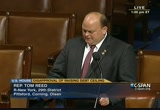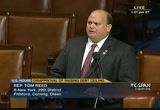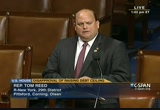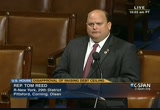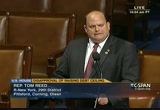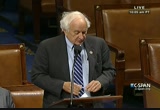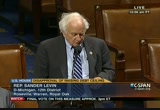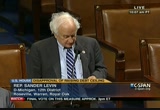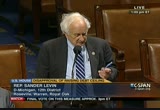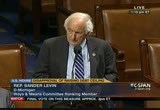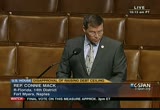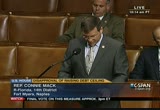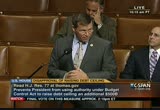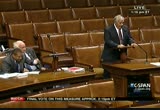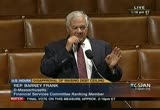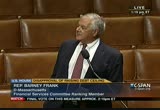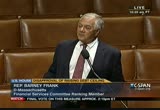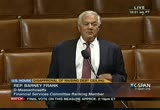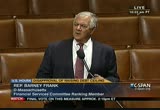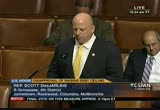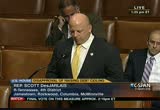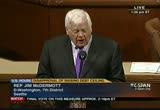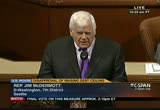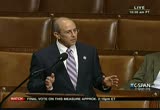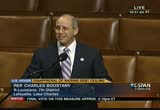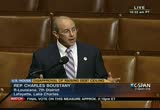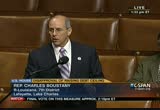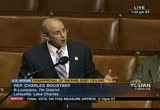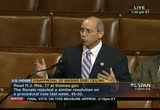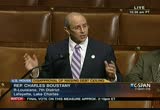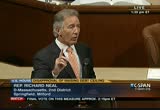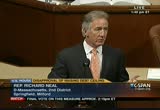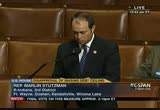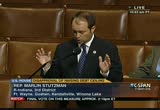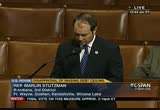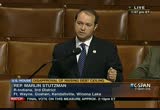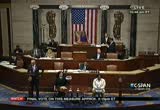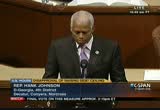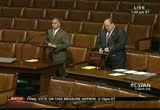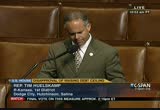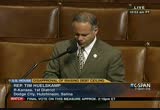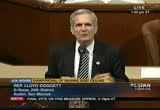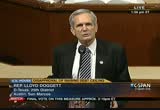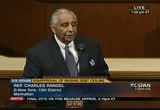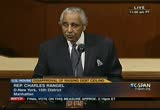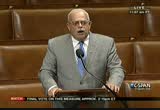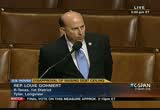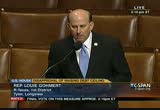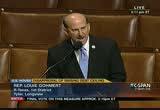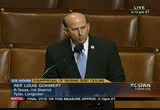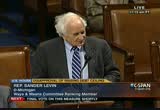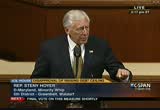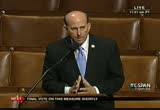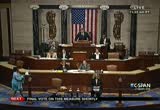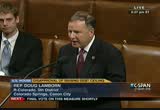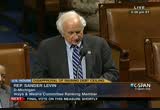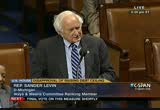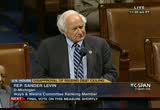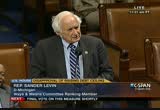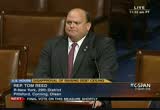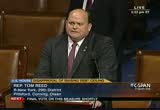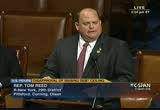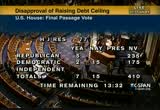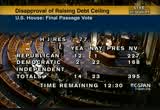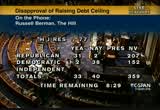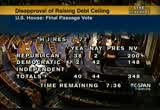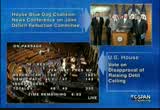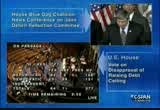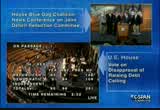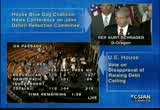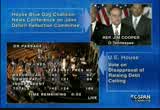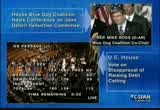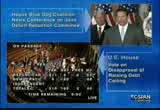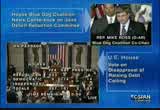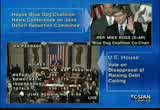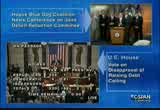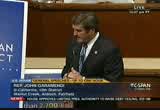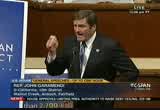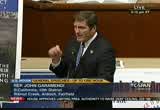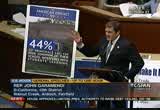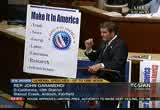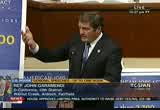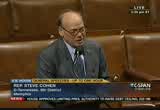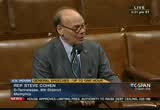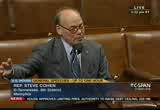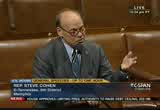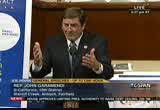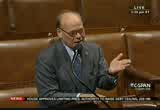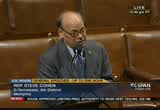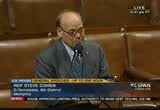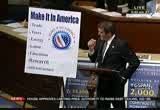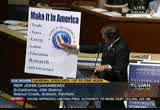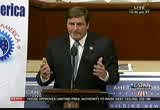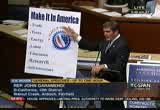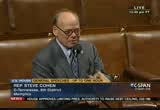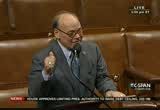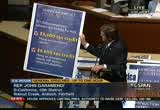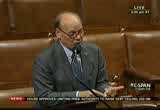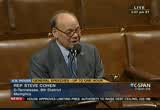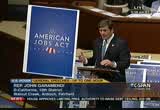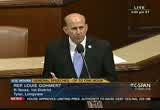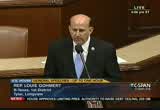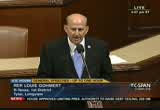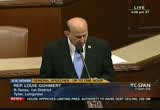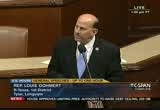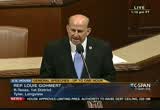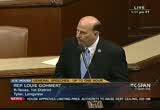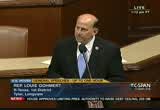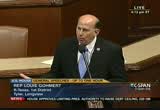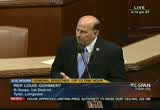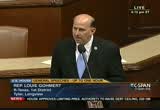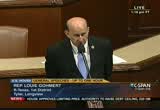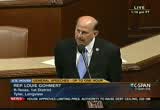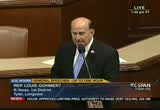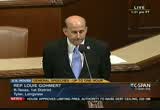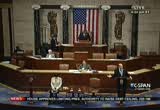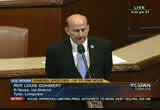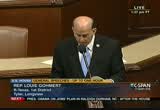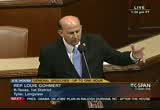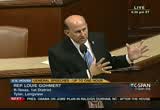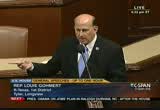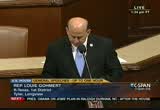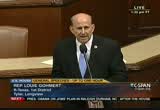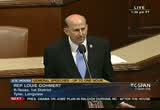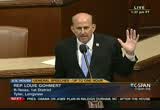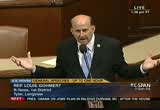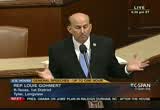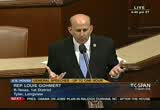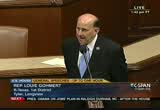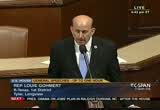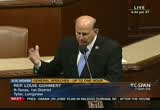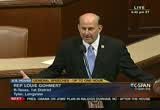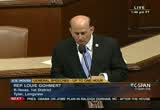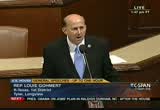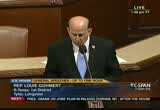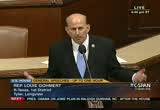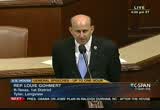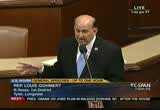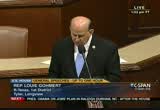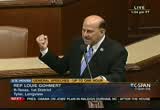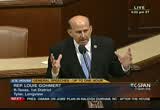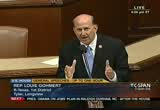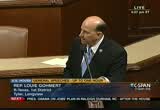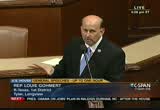tv U.S. House of Representatives CSPAN September 14, 2011 1:00pm-5:00pm EDT
1:00 pm
its passage without intervening motion except two hours of debate equally divided and controlled by the gentleman from new york, mr. reed, as the proponent and the gentleman from michigan, mr. levin, as the opponent. the chair recognizes the gentleman from new york. mr. reed: i yield myself such time as i may consume. the speaker pro tempore: the gentleman is recognized. mr. reed: madam speaker, i also ask unanimous consent that all members may have five legislative days to revise and extend their remarks and include extraneous material on the subjectle of bill under consideration. the speaker pro tempore: without objection. . mr. reed: madam speaker, i am pleased to offer this resolution of disapproval of the request from the president of the united states to borrow an additional $1.5 trillion. dealing with this national debt is one of the primary reasons why i ran for congress. it is to stop the endless borrowing of washington, d.c., on the backs of our children and our grandchildren. i am also pleased to offer it in the house as a demonstration of a commitment to ending the
1:01 pm
decades' old borrow and spend practices and mentality that runs rampant here in washington. our national debt has reached its breaking point. the need to make serious decisions to get our spending under control has never been more urgent. as we have all heard the words of admiral mike mullen, chairman of the joint chiefs of staff, when asked what is the most direct threat to our nation, his immediate and clear response was that it is our national debt is the greatest threat to our national security. and the recent down grade of our national credit rating by snchings&p further demonstrates the necessity of making significant structural changes to the way we spend money in washington, d.c. my focus here today, because we know the senate has acted and this resolution did not pass the senate and is likely not to result in the borrowing --
1:02 pm
barring the president getting the half a trillion dollars of borrowing, but it's to send a message to the nation that we need to act proactively in this chamber and in both chambers of this house. we need to recognize the national debt and rather than deal with it in a crisis situation, we should be mindful of it in a proactive, strategic, open and honest manner so that we have good, sound policy responses to the issue that we face in finally taming this beast known as the national debt. we have spent over $15 trillion of money we did not have. that national debt is growing at the rate of $58,000 per second. that's $55,000 owed by every man, child, woman in america. that level of borrowing, that level of spending is just not acceptable because it
1:03 pm
jeopardizes our nation and more importantly jeopardizes our nation for the generations yet to come. the american people have made it clear, they spoke loudly in november, 2010. and we are listening. more borrowing won't solve the problem, in fact it will dig the hole even deeper. borrowing even more before we can enact significant spending cuts to begin dealing with the root problem is a foolish errand. we have a responsibility to future generations to take immediate action. i will continue along the path of working on both sides of this chamber to try to identify common ground to solve this crisis in the national debt. the continuing resolution last spring and the budget control act which requires this vote are only the beginning. this war on our national debt is going to go on for many years to
1:04 pm
come. but we need to take those first steps because with every journey it takes the first step to get us on the path to success. i know the battles ahead will not be popular and there will be tremendous political pressure on all of us to continue to borrow and spend as usual but we must stand up to that political pressure. we must honor our oath to do our duty and do our job in this chamber and that means standing up and changing the path of washington, d.c. making difficult decisions now is the only way we can win this war on what is a common enemy we all face. our national debt. it is my hope this resolution continues to show the president how serious we are about this issue. and at the same time that we're dealing with this issue we will focus on jobs, we will focus on the economy, we in the united
1:05 pm
states congress have to be able to walk and chew gum at the same time. we are competent men and women in this chamber who love our great nation. and we must come together on all fronts, at all times, not only on the national debt but on our economy, on getting americans back to work. and i think with that bipartisan attitude it will be amazing what we can accomplish in order to achieve all those goals, the national debt being one of the critical ones that we must face head on today. and with that i'll reserve the balance of my time. the speaker pro tempore: the gentleman reserves the balance of his time. the gentleman from michigan. mr. levin: i yield myself such time as i may consume. the speaker pro tempore: the gentleman is recognized. mr. levin: madam speaker, we should not even be considering this resolution. i repeat, we should not even be
1:06 pm
considering this resolution. we should be moving forward, not backwards. this resolution is a dangerous distraction from the unprecedented challenge before us. 14 million americans are looking for work, 14 million. the census bureau reported just yesterday that the poverty rate is higher than it's been in 17 years. 17 years. and median income in this country is at 1996 levels. 1996 levels. the president has proposed a job bill that one knowledgeable observer, mark zandi, estimates would create 1.9 million new jobs and add two percentage points to g.d.p. growth next
1:07 pm
year. we need action to spur economic growth and job creation. that's what we should be considering today. instead through this resolution republicans want to prolong the agony of the debt limit debate and take us back to the brink of default which would be where we would be if you succeeded. this bill can pass the house only if members who voted yes in august on this issue decide in essence to vote no in september. yes, in august -- yes in august, no in september. this nation wants us to be guided by the needs of the nation, not the internal
1:08 pm
politics of a caucus or a conference. we've seen the consequences of that kind of thing. down grading our credit rating, i quote, it involved a level of brinkmanship greater than what we had expected earlier in the year, end of quote. in august, consumer confidence dropped by the largest amount since the peak of the financial crisis in 2008. and the conference board noted a direct link between that fall and the debate over default. and i think we need only to check 401-k statements from august to remember the precipitous drop in the stock market. were this resolution to become law and all those who speak or
1:09 pm
vote for it have to understand that, the u.s. would default on its obligations for the first time in our history. this would throw our economy back into deep recession, trigger $400 billion in immediate job-destroying cuts and call into question our ability to pay earned social security and medicare benefits. madam speaker, we should not be considering this resolution today. we should be moving forward on the president's plan to jumpstart our economy and create jobs for american workers. the american jobs act would put more money in workers' pockets through a temporary tax cut, saving the average family $1,500 a year. it would also keep over six million workers from losing
1:10 pm
their unemployment benefits while they continue searching for work and provide this proposal new employer incentives to help get them hired. if we don't act on these issues over a million people will lose their unemployment benefits in january and over two million in february. so we need to act, we need to look ahead not just try to go backwards. so i strongly urge my colleagues to vote no on this resolution so we don't waste one more minute on a renewal of republican brinksmanship. 14 million americans who are looking for a job and 43 million americans who are living in poverty cannot afford to wait one minute longer.
1:11 pm
i reserve the balance of my time. the speaker pro tempore: the gentleman reserves the balance of his time. the gentleman from new york. mr. reed: madam speaker, at this time i'm pleased to yield five minutes to the gentleman from florida, mr. mack. the speaker pro tempore: the gentleman from florida is recognized for five minutes. mr. mack: i thank the gentleman and, madam speaker, i rise today in support of this resolution of disapproval because washington will continue to have a deficit spending problem until we say, enough is enough. and we put a stop to it. the gentleman across the aisle would like to say that this is going backwards. every time i hear someone on the left speak it ends up costing us more money. we need to stop the insanity here in washington, we need to stop this overspending. it seems like the only proposals that are coming our way are more spending and more taxes. so i strongly support this
1:12 pm
resolution. i opposed the debt deal because we can no longer wait to make deep spending cuts and balance our federal budget. and we need to act now. today we have an opportunity to prevent some of the debt deal from going into an affect and disaemploy the government from borrowing -- disaplowing the government from borrowing another $500 billion, borrow another half trillion dollars. recently we've heard the president keep saying on his new proposal, pass this bill now, pass this bill now, pass this bill today. when i'm saying, and the american people are saying, stop the spending now, stop the spending today, stop putting this burden on our children and grandchildren. yet the president wants to continue to go out there and sell a jobs plan that is more of the same. and he wants to pay for it, mysteriously, shockingly, by
1:13 pm
raising taxes that will do nothing but kill jobs. so his own proposal that he wants the congress to take up in effect is going to destroy jobs. somehow we've got to convince people here in washington and the president that it's not the government that creates jobs. it's the individual, it's the entrepreneurs, the person willing to take risk, but they're not willing to take risk in an economy where the president continues to try to push more regulation and more laws and more taxes. it just doesn't make sense and the american people are fed up. they've had it. enough is enough. we've spent way too much money. during the august district work period over 500 people showed up to my town hall meeting in fort myers, florida. and do you know what i heard over and over again? quote, hold the line on government spending. quote, stay strong.
1:14 pm
quote, reduce government and this one i love, it's not your money, it's my money. see, only in washington do people in this room look at it as your money, as their money is your money. it's not. it's the people who have earned it. a comment was made by a constituent of mine, edward bunett, that i think speaks directly to this issue. he said, and i quote, we have to reduce the size and scope of government. i'm unemployed but just because i don't have a job doesn't mean my neighbor should have to pay for me. and then he continued on and i quote, the best way for government to help is to step aside, get out of the way and let the individual and businesses do what they do best. he and his family are willing to
1:15 pm
sacrifice to preserve the economic freedom for americans. we must cut spending now. that's why i introduced the 1% spending reduction act. as it's commonly known, the mack-penny plan. with this plan we can balance the budget in eight years. by capping spending at 18% of g.d.p. in the seventh year and cutting one penny out of every federal dollar for six years. one penny. everybody at home, e business, every individual has had to take more than one penny out of their home budget or one penny out of their business budget over the last four, five, six years and for the federal government to instead be talking about spending more money each year we need to cut spending. we need to balance our budget. my plan will balance the budget
1:16 pm
in eight years and for those who might want to say, well, we're not for across-the-board cuts, great. we decide where the 1% comes from but if the congress fails we will have the across-the-board cut. either way we are going to bet the 1% across the board. the deficit spending has to stop. and like i said before, enough is enough. i support this resolution, and i would encourage all of my colleagues, democrats and republicans, to join me in supporting this resolution. thank you very much. the speaker pro tempore: the gentleman's time has expired. the gentleman from michigan. mr. levin: i yield myself 15 seconds. the speaker pro tempore: the gentleman is recognized. mr. levin: to the gentleman, working together won't work if you undo the work that we did together. i now yield five minutes to the ranking member of the financial services committee, mr. frank. the speaker pro tempore: the gentleman from massachusetts is recognized for five minutes. mr. frank: madam speaker, i am
1:17 pm
is great fan of the tradition of comedy in america, and i want to salute my republican colleagues for this tribute to one of our great comedians who died tragically early, gilda ratner, who in the early days of "saturday night live" invented the character of rosanne, rosannea danna. she would say something outlandish and when she was corrected her response was, never mind. this is the never mind resolution that the republicans have put forward. put should understand what this says. it says that the bill that we passed that kept the government from shutting down -- and i didn't like that bill, but i like the part of it that kept the government from shutting down. i was ready to vote just for an increase in the debt limit. singling the debt limit, canceling it, this is what it does. and here's the problem.
1:18 pm
we have a majority that has a problem with reality. they have a problem with reality in the field of science. they have a problem with reality in the field of the economy. one of the manifestations of that is their objection to raising the debt limit, that was in large part necessary because of debts they incurred. you know, when the debt limit came up it struck me, it wasn't my debt limit. i didn't vote for the war in iraq at a cross-of $1 trillion. i didn't vote to give millionaires a tax cut they didn't need or had no beneficial effect on the economy, but i did out of a sense of responsibility to vote to raise the debt limit. i voted against one of them but i voted for several others. what this bill says is, yes, we had to because we were getting a lot of pressure vote to raise the debt limit, but now that is safely behind us, we're going to pretend that we were really against it. so this is the never mind resolution.
1:19 pm
people should understand this. what this resolution would do would be to undo what just happened. so we have members on the majority side who have trouble explaining to their primary voters why they had a temporary embrace of reality. now, they're not comfortable with that. their primary voters aren't comfortable with that. so having done what they had to do they now want to pretend they're going to undo it. the senate's already killed this. they don't want it to pass because understand what it would do. it would put us right back in the debt limit situation crisis. and by the way, these are people who are putting this resolution forward who purported -- believe that a major concern with the economy today is the uncertainty that faces investors. so what do they do? they bring up a resolution today that would re-create, if anyone would take it seriously and i would give them the credit of saying that they don't -- but if anyone would take it seriously it would create the uncertainty we have seen in a long time, whether or
1:20 pm
not the federal government is going to shut down. so that's the phonyness of this. now, let's talk about the substance. my colleagues claim to be against spending. apparently in their world the $700 billion -- nearly $700 billion that is spent annually by the pentagon isn't spending. i don't know what it is. we have a situation in which this year in the budget the republicans brought forward a bill to increase military spending by $17 billion while funds for local police and funds for local street repair were cut. so that's the problem. yes, i am for reducing spending. i am for reducing a slowing pentagon budget. we had the president ask it reduced by the number -- reduced by 10,000 the troops in afghanistan. many on the republican side, including the leadership, criticized him for that. do you think that troops in afghanistan are paid for by
1:21 pm
funny money? the fact is that while on the one hand we hear these complaints about spending we have people pushing for more and more spending. and i have to say here that -- i would include my administration in this and i think if the president expects us to go on with certain restraints elsewhere, adding billions of dollars to what we have already wasted in iraq by keeping thousands of troops in iraq beyond this -- and by the way, why are we keeping troops in iraq? one of the leading advocates for keeping troops in iraq, senator graham said we should keep troops in iraq because we need to police the border between the arabs and the kurds. that at a time when we are denying funds to our cities to police their own areas. so let's be clear. first of all this sham says, you know what, we had a vote to raise the debt limit. we are now going to engage in this mock exercise of taking back what we did. if anyone takes it seriously it will send waves of uncertainty back into the economy.
1:22 pm
but secondly, going forward, yes, join us. and that includes some on the republican side. unfortunately a small minority. don't give more and more and more for the military. not to defend america, not to fight terrorism. those things are not in controversial but to subsidize the wealthy european nation. madam speaker, the nato nations outside the united states spend an average of 1.7% of their gross domestic product on the military. we spend 5.4%, more than three times as much. and my republican colleagues have resisted reducing that. what they want to do is to subsidize the social safety nets and the spending of western europe at the expense of spending here. and how do we do that? by allowing them to hold down the military. so people who want to keep troops in iraq, people who objected when the president began a withdrawal that was too timid from my judgment from
1:23 pm
afghanistan, people who want to continue to spend unnecessarily and unwisely, not to defend america but to keep america and as the worldwide policemen have no credibility -- from spending. the speaker pro tempore: the gentleman's time has expired. the gentleman from new york. mr. reed: madam speaker, i'm pleased to yield five minutes to my friend from tennessee. the speaker pro tempore: the gentleman is recognized for five minutes. >> for too long the federal government has been allowed to engage in an irresponsible spending spree that's allowed in the accumulation of over $14 trillion of debt. $3 of that debt occurred in the last three years under president obama. does anyone really believe that the american people have received a good return on the investment? mr. desjarlais: i know that many of my constituents in tennessee's fourth district don't. unemployment is still above 9% and our economy is still not creating jobs. an now this president claims to
1:24 pm
need a $2.4 billion blank check to continue with his failed policies. that means our national debt would be close to $17 trillion by the end of next year. enough is enough. the latest assessment of our debt indicates it will reach 109% of g.d.p. in the next decade. that will only further degrade employers' confidence in our economy and hinder their ability to create jobs. we cannot allow that to happen. i was elected by the people of tennessee's fourth congressional district to come to washington to finally make the federal government to learn to live within its means. no more borrowing 40 cents out of every dollar. no more trillion-dollar deficits, no more stimulus spending and more importantly, no more expecting our children and grandchildren to pay for all of this. the debt limit debate provided us with a real opportunity to put our nation back on a
1:25 pm
fiscally sustainable path by finally forcing the federal government to make difficult but badly needed spending decisions. decisions that i am more than willing to make. i believe that we missed an opportunity to open up the books and do something that should have been done years ago. prioritize our spending. it is hard to believe that with all the waste, fraud and abuse that occurs within the federal government that we would have any problem cutting enough spending so that raising the debt limit would be unnecessary. when families in my district have spent more than their budget allows they look to how they can cut back. not how they can borrow more money. maybe they don't take a vacation that summer. maybe they go out to eat less often or hold off on purchasing a new car. the point is they know that the answer to getting back on the right fiscal track is spending less, not borrowing more. the same should hold true for the federal government.
1:26 pm
i urge my colleagues to join me in voting in favor of this joint resolution of disapproval. madam speaker, i yield back. the speaker pro tempore: the gentleman yields back. the gentleman from michigan. mr. levin: i now yield three minutes to another member of the ways and means committee, mr. mcdermott from seattle, washington. the speaker pro tempore: the gentleman from washington is recognized for three minutes. mr. mcdermott: madam speaker, i rise in opposition to this resolution because it is in favor of the united states defaulting on its debts. the republican party is calling for the united states to default, to tell the whole world, we don't pay our debts. that's what this is about, and it doesn't do one single thing to help american workers or businesses with jobs. now, make no mistake. the house of representatives is being used by the tea party as an attack machine on the
1:27 pm
president. they will delay action on anything that helps the economy. the president came up here on thursday with a plan. where's the schedule for bringing it out on the floor? no, we had to delay economic recovery. it's a small price to pay if they can win an election. they don't care about ordinary folks, working people. they only care about the people on the top. instead of doing something to help create jobs they brought up this bill to chin up their extreme base that thinks the only things americans should build together is roads and the defense department. that's what the u.s. government is all about. nothing else makes any difference. we don't need to invest in health or science. what do we need science for? oh, it will work out. don't worry.
1:28 pm
in this resolution the republicans are voting for the united states not to pay its bills. that's what we're spending time on. now, today is just another day in the alice in wonderland of the republican house. pure politics and nothing to help the american people get jobs. this whole republican congress is about the presidential election. it has been from the beginning back in january. not helping the middle class. what have they done for foreclosures in this country? what have they done for youngsters trying to go to school? what have they done for anybody except try and get the president and they are trying it by stopping the economy from moving forward. i urge my colleagues not to just vote no on this but for the majority to withdraw it and bring up the americans jobs act.
1:29 pm
the president brought it up here. it deserves to be brought up to the floor and debated and amended and passed. i sometimes wonder when i listening to the discussion of about some long-term investment, if a republican has ever bought a house, i remember when i bought my first house in seattle. i was 25 years old. i was a medical resident. i paid $16,400 for it, and i wondered if i would be ever be able to pay for it. i wasn't making that much money in those days. mr. levin: i give the gentleman an additional minute. mr. mcdermott: lo and behold i have bought houses and you know what, 30 years later i paid off that house. that's what investment is about. but the president is saying is we have to invest in this country if we're going it bring it out of the problems it's in and that means infrastructure on the ground and it means in human beings in education.
1:30 pm
if we don't invest as the greatest generation did after the second world war, eisenhower said, hey, we have to build roads. nobody said, can't go in debt for all that. nobody said we can't invest in human beings. we did the g.i. bill of rights and that's what made us the strongest country in the world. we took every veteran who came back from the war and said, here's a college education, get it and take it out and make this country work. that was investment. but not today's republican party. oh, no. we can't -- we mustn't. oh. don't you understand investment? i yield back the balance of my time. the speaker pro tempore: the gentleman yields back the balance of his time. the gentleman from new york. mr. reed: madam speaker, at this time i'm pleased to yield five minutes to the gentleman from louisiana. the speaker pro tempore: the gentleman from louisiana is recognized for five minutes. mr. boustany: thank you, madam speaker. and i thank the gentleman from new york for yielding time to
1:31 pm
me. madam speaker, it's been said that leadership is willing to make hard choices. fact-based choices to come up with solutions to solve problems. and deliver results. now, we gathered here last thursday in this chamber to hear the president, with a much-touted plan beforehand that he was going to bring forth to the american people that was going to help solve the high unemployment in this country and get our economy back on a competitive basis. and i can tell you, madam speaker, i sat there and listened very intently. and i left this chamber with grave disappointment. because it's not enough. furthermore, he's proposing taxes, new taxes. taming taxes on energy production, american energy -- taxes on energy production, american energy production. let's look at the facts of what happened. we had an oil spill in the gulf of mexico and it was dealt with and it was a tragic situation buzz but it has been dealt with. the fact of the matter is we need american energy production to move this country forward. and now what we're seeing with the lifting of the moratorium is this continued de facto
1:32 pm
moratorium because of slow walking of exploration plants and permits. now, what does this mean? if we brought back the permitting process to the same time frame we had before, without sacrificing safety, bring it back into a reasonable amount of time, let's say 30 days, to take care of these permits, in one year, the year 2012, 230,000 jobs would be created. new jobs, good, high-paying jobs. not only that, 1/3 of those jobs would be beyond the gulf coast states around this country, in california and florida and in the central part of the country. this would add $44 billion to our g.d.p. and that's just getting things back to where it was. that's not even talking about expanding exploration in the shale formations or looking at the east and west coast where we can do more or alaska. these energy jobs are good-paying jobs and not only
1:33 pm
that, it would bring in, in one year, $12 billion more into the treasury and reduce our bill on foreign oil by $15 billion. and that's just getting us back to where we were. now, i stood here and listened to the president. instead he offers taxes. $45 billion more in taxes, new taxes on independent oil and gas companies. that's going to hurt american energy production, it's going to kill american jobs and it's going to do nothing to help solve our economy. furthermore he childed us about the trade agreements. we have three trade agreements that have been sitting there for three years, they've been negotiated, they're ready to go. and he said, congress needs to pass them. well, mr. president, the answer is, that's the process. and beyond that, what is our trade boil? this country's losing credibility globally and it's losing its leverage because we have no trade strategy. a strategy that's going to
1:34 pm
promote american manufactured goods, american farmers and their commodities so, that we can sell these around the world to open markets. that will get our economy going. if we want to solve our debt problem, yes, we've got to balance our budgets, yes, we got to deal with the debt problem, we've taken some steps, but i saw nothing that the president offered and that's why i'm here supporting this resolution, to push this president to consider the steps that need to be taken to promote american competitiveness. private sector job growth, that's what we need in this economy. now, the president had the answer, he was standing here at this podium and he had the answer right up there on the wall of the house behind him. there's a plaque up there and it's a quote from daniel webster and that first sentence in the quote says, let us develop the resources of our land. what's wrong with that, mr. president? for god's sake, we need american
1:35 pm
energy production and it's simple. stroke of a pen he could solve this permitting problem and at least get us back to where we were, create 230,000 jobs next year, add to our g.d.p. growth and this would be a start, a down payment to a comprehensive energy strategy for this country. this is a no-brainer. we need natural gas as part of our transition strategy. his policy's going to lock out natural gas production in this country. 97% of it is done by small domestic companies here in the u.s. and these taxes will put many of these companies out of business. mr. president, read the plaque. let's develop our natural resources. let's do what we have to do. let's promote a very aggressive export-oriented trade policy. and we need a willing partner to move forward with tax reform. we're getting half-hearted signals. this country needs fundamental tax reform. we want to do it on the house ways and means committee, we're ready, we stand ready as willing
1:36 pm
partners. but yet we're getting signals, mixed signals. the president has not shown, his administration has not shown a serious intent to move forward with fundamental tax reform that will unleash american ingenuity and entrepreneurship in this country. and that's what i heard all through august when i was back home in my district. when i talked to folks. they want to see an energy strategy. they want to see comprehensive tax reform that simplifies our code and lowers rates, clears up some of the loopholes, and they want to make sense out of the tax code and they want to see us selling goods overseas, letting our ports expand. he didn't even mention maritime infrastructure. we've got bills right now that would improve our maritime structure without costing one penny more in deficit spending. why aren't we acting on these things? we're tired of rhetoric, we're tired of political talking points and what we need is action. the american people have had enough. and i say, let's get to work, let's get this house moving on
1:37 pm
fundamental changes that will improve this economy and create private sector jobs. i yield back. the speaker pro tempore: the gentleman's time has expired. the gentleman from michigan. mr. levin: i yield myself 30 seconds before i yield. i want to say to the gentleman from louisiana, i listened intently and i don't understand how he could have voted yes to raise the debt ceiling in august and now in essence he's going to vote no and bring this country back to the brink of chaos. i now yield three minutes to the very distinguished gentleman, a very active member of our committee, mr. neal. the speaker pro tempore: the gentleman from massachusetts is recognized for three minutes. mr. neal: thank you, mr. levin. madam speaker, i'm fascinated by this argument for the people that are viewing it largely because this isn't not an argument about new spending. this is an argument about paying for past spending. so when bill clinton said ado,
1:38 pm
say good bay too -- goodbye to the american people on january 19 of 2001, this is fact, not opinion, america was staring at a 5.6 -- $5.6 trillion surplus. on january 20, george bush took the oath of office and when he left eight years later we were looking at a $10.6 trillion deficit. let's recount those years. two wars, $2.3 trillion worth of tax cuts, a prescription debenefit that was unfunded and all of the money they applied to those arguments, and i'm very pleased by the fact i voted against those tax cuts, both against them and voted against the war in iraq, but all of the money that i've just referenced was borrowed money by the republican party.
1:39 pm
they borrowed all the money for it. fact, not opinion. and now the bill has come due and they're on the floor talking about fiscal rectitude. hears what -- here's what i think is important. the gentleman from florida opened this debate, my friend, mr. mack, by talking about our money. and how that money is utilized. well, guess what? the veterans hospitals, 35,000 men and women wounded in iraq and afghanistan. is he saying that that's not our money that ought to pay for those hospitals? it is estimated that the cost of disability for the war in iraq will be between $500 billion and $900 billion. i hope people pay attention to what i'm about to say. almost one of the two -- one out of two people who have served us
1:40 pm
honorably in iraq and afghanistan, they're cull coming back with a long-term disability. those v.a. hospitals are going to be stretched for years to come, whether you were for iraq or against it, our responsibility is to pay for those men and women who served us honorably. 20 years old, life expectancy of 80, they're in our care for the next 60 years. i would note with some humor that the republican leadership did not send out today people that were here for the tax cut vote or for the vote of the war in iraq. remember weapons of mass destruction and how that vote was to take place? friends, this is about paying our bills. this is not about new spending. i hope there's no confusion. today because of the wars in iraq and afghanistan every american citizen has a bill of $17,000.
1:41 pm
they helped bring us to this path of fiscal irresponsibility during their years of borrowing and borrowing and borrowing and they ask the american people to embrace amnesia. they set the fire and no they're calling the fire department -- and now they're calling the fire department. this is a very simple vote. it's a about paying our -- it's about paying our bills. the speaker pro tempore: the gentleman's time has expired. the gentleman from new york. mr. reed: madam speaker, at this time i'm pleased to yield five minutes to my colleague from indiana, mr. stutzman. the speaker pro tempore: the gentleman from indiana is recognized for five minutes. mr. stutzman: thank you, madam speaker, and i'd like to thank the gentleman from new york for yielding. on such an important subject that we're talking about today, i'd like to make a couple of points in reference to what the gentleman from massachusetts just made. in regarding the republican party. and i would say that the republican party did make mistakes at the beginning of this decade.
1:42 pm
i would say the democrat party has made some mistakes in the last several years. i think there's plenty of blame to go around for both parties in washington. there's a new crew in town, there's 87 new republicans that were elected last november from all across this country who have joined those in our party who are saying, stop the spending. stop the madness. we're working against ourselves, folks. madam speaker, i would say that, you know, we wouldn't have to continue having this discussion if we would stop spending, stop borrowing and then we would focus oe omy. it's going to take both sides to come together to fix the problem within our economy. we're going to have to control our spending weerks going to have to help those americans who are out there and those who are actually establishing jobs, those who are creating jobs. it's not the u.s. government that is going to create the jobs for those who run employed. -- who are unemployed.
1:43 pm
i believe we have a great opportunity right now to again say, let's stop this sort of spending binge in washington, d.c., where we're passing on debt tower kids and grandkids, this is an opportunity for us to come together, both parties, and say, let's forget about the sins of the past, let's pay those bills, but let's not continue to spend the way that we're spending today. from a debt of $79 million when the revolutionary war ended, the united states has racked up a debt of nearly $14.6 trillion. it would take nearly everything that americans produced in all of last year to pay off the existing national debt. right now i see two competing visions in washington and across this country, madam speaker. the first vision is the business as usual vision. and we see a lot of that right here in washington. it says we need to blindly increase our debt and if people complain, call it investment
1:44 pm
instead of debt. in may president obama called for a no-cuts attached increase to the debt ceiling. he didn't give up his call for a blank check until his request was -- had failed here in this house by an overwhelming and bipartisan vote of 97-318. the second vision that i hear a lot about back in indiana is the same vision and the same work that families do every year. you figure out how to live within your means. you have real cuts, not budgetary gimmicks, you don't fool yourself when you're sitting around the kitchen table trying to figure out the mess you find yourselves in. it's based on the truth. families sit down at the kitchen table and have the heart to heart talks about the situation that they're in. two conclusions that they usually come to are, we have to cut spending and we're going to have to figure out how to bring more dollars in. it accepts the challenge,
1:45 pm
americans accept the challenge knowing that these things are not easy. we know that the business as usual vision is broken and it will inevitably lead to us ruin and more ruin. this vote is a vote against that vision. i come to the floor to support the second vision, the vision that americans across this country support. a vision that is shared by the men and women of northeast indiana. it is a vision of prudence, honest conversation and optimism . when we get pulled into these discussions because of the continual discussion about more spending, we cannot focus on the important part of getting people back to work and growing our economy. government doesn't create jobs, governors don't create jobs, americans create jobs and i believe in the american people and that hope is still a part of our vocabulary and i believe that we're also changing the discussion here in washington.
1:46 pm
current politicians have had their day in washington and it's time to talk about cuts and since we've talked about cuts the sky has not fallen. optimism is a part of what the american fabric is built upon and i believe that this joint deficit committee needs to find common ground for actual cuts and that the senate will pick up the job growth bills that we passed right here on the floor of the house of representatives this congress. we all knew that this debt creeldeg bait was never going to be -- ceiling debate was never going to be our final battle in a struggle for balanced budgets and fiscal responsibility. it gives us the chance to continue to talk about it and if we want to continue to raise debt, if we want to continue to increase spending, we'll continue to talk about why we need to restrain washington politicians. i'm going to continue the dialogue, i believe it's crucial, it's an important part of saving this country's economic future for my kids,s for our children and for our grandchildren across this
1:47 pm
country. government has for too long continued this business as usual and the status quo vision that i talked about earlier. americans are going to have to pay back all of this debt. this may not be a tax increase but inevitably and indirectly it is. so, madam speaker, i come to the floor in support of this resolution. i thank the gentleman. mr. reed: i yield another minute. mr. stutzman: i come to the floor to support this resolution because i believe we need to all agree, republicans and democrats, that we're going to limit spending, we're going to stop borrowing. we can pay our bills back, but at the same time we're going to focus on job creation, getting people back to work as the gentleman from louisiana mentioned, the energy jobs that were talked about. you know, that was one of the things the president didn't discuss in his address the other night is he didn't talk
1:48 pm
about energy. we are the leaders in the world on production. i come from an area with a lot of manufacturing. i believe if we can focus on energy, cut spending, we need to reform government, that's what's going to get people back to work, the economy is going to grow. we will still be number one in the world, and i yield back. the speaker pro tempore: the gentleman yields back. the gentleman from michigan. mr. levin: i yield myself 30 seconds. the speaker pro tempore: the gentleman is recognized. mr. levin: you know, this resolution isn't about a new vision. it's really about blind rage. there may be a new crew in town, but if this were to pass it would be a wrecking crew because essentially we would be back on the edge once again of default. i now yield two minutes to the very distinguished gentleman from georgia. the speaker pro tempore: the gentleman from georgia is recognized for two minutes. mr. johnson: thank you, mr.
1:49 pm
speaker, and mr. ranking member. america was united in its disgust as the spectacle in washington during the debt ceiling fiasco. the republican threat of defunct default is part of modern american history. it reduced faith in the united states of america. it also undermined the american people's trust in its government. there's no reason to have a debt ceiling at all. it doesn't restrain spending since the spending has already been committed. it just threatens our credit, and it weakens our country. that's why i, representative nadler and representative moran introduced this morning the full faith in credit act, a bill to do away with the debt ceiling once and for all.
1:50 pm
but if we are going to have a debt ceiling, the threat by members of congress to refuse to raise it is an outrage. we've already made these commitments, yet, some would have us default. some would undermine the full faith and credit of the united states. some would do irreparable damage to our country and our standing in the world. it's a disgrace, it's a total disgrace and the american people see it for what it is, part of a concerted effort to undermine this economy in order to undermine the president and fulfill the congressional republicans' inauguration day vow to do everything within their power to ensure that president obama would be a one-term president. i yield the balance of my time. the speaker pro tempore: the gentleman yields back. the gentleman from new york. mr. reed: madam speaker, at this time i'm pleased to yield
1:51 pm
five minutes to the gentleman from kansas, mr. huelskamp. the speaker pro tempore: the gentleman from kansas is recognized for five minutes. mr. huelskamp: thank you, madam speaker. i appreciate the gentleman from new york yielding to me. i do support this resolution. here in this chamber, actually here in america we often talk about achievements in terms of metrics. the larger the better. for a private company it's impressive when it has a large budget, a large work force and large profit and a large presence. the federal government as an institution should not talk this way. even though similar assertions would all be true. washington spends too much, employs too many people and is too intrusive in the lives of all americans. the major difference is that private business makes vefments that delivers returns and -- investments that delivers returns. the federal government's spending fails to deliver real ruments. the federal government did not meet its demise the all too
1:52 pm
negative consequences fall on taxpayers and as a result a new government program or a dozen or more. if we were thinking like a business person wee would consider the results that have come from past investments before making another. 2 1/2 years ago the previous congress and this current president implemented a stimulus that ultimately will cost americans more than $1 trillion. yes, $1 trillion. this negative investment was supposed to create 3.5 million jobs. this investment was supposed to bring an unemployment rate of 6.4% last month. but what has actually happened? the president is more than six million jobs short and employment stood at 9.1% last month. that's not even counting the millions of americans who are underemployed. the budget control act, which the president signed, was supposed to be about putting an end to washington as usual. spend and borrow.
1:53 pm
spend and borrow some more. yet, when the president came to this floor a week ago tomorrow we heard another cycled idea, a new stimulus. excess of spending that will underperform and underdeliver. spend, spend, spend, raise taxes and borrow more to pay for that spending. raise those taxes from the very individuals and businesses that can actually create jobs, that will get the economy out of this rut and put millions of americans to work. and along the way, let's demonize job creators. that's what happened in this chamber. you know, i believe the federal government should function as efficiently and effectively as a private business. but it by no means should be able to brag about a large budget that fails to deliver and which only adds to the red ink each year. before adding to the $15 trillion in debt this country already has or sustaining more years of trillion-dollar annual deficits we have no choice and
1:54 pm
the american people expect mo less. cut -- no less. cut current spending and cut future spending obligations and pass a balanced budget amendment. i support this resolution and yield back the balance of my time. the speaker pro tempore: the gentleman yields back. the gentleman from michigan. mr. levin: it's now my privilege to yield three minutes to another active member of our committee, mr. doggett of texas. the speaker pro tempore: the gentleman from texas is recognized for three minutes. mr. doggett: i thank the gentleman. you know, i think it's clear that this resolution is just not my cup of tea but i can tell you if we followed the path that was just recommended, republicans could drive us deeper into recession or even depression. you know, it's as if the republicans who are here today want to start halloween early because they keep trying to bring back the life as if it was some zombie, the specter of debt default that's always caused us so many problems. building on the earlier success
1:55 pm
in sewing panic and reaping fear in our global financial markets that contributed to the first-ever downgrade of our nation's credit rating, these professional obstructionist are determined to keep trying to wreak havoc as families are demanding action on the economy, a response to jobs, the republicans instead are focusing on pandering to a small group of people for whom reality doesn't seem to make much difference. the problem is reality has a democratic bias when it comes to this question of the economy and job creation. i think if the republicans really want to help us close the debt, the gap, the best way to do that is to get this economy moving. an increase in economic growth will do more than any of the things that he just mentioned, some amendment that might be approved years from now will do more to help us get the debt under control more than
1:56 pm
anything else. how do we end up with the debt we have today? well, much of it is directly related to the policies of the bush-cheney years when republicans were totally ignoring the issue of debt. unpaid wars, tax cuts based on the methodology that they would pay for themselves when they just dug us deeper into debt. and now we face trying to get our economy moving again. their solution, do less. jeopardize the full faith and credit of the united states. i think one of the problems that we have here, and it afflicts the democratic party to some extent as well as the republicans, but especially with our republican colleagues, it's that we just got too many certified smart people here in washington. they are so smart they know what they know. they just don't know what the american people are experiencing. you don't have very many people advising about this economic recovery whoever had to drive a truck for a living. you don't have people who worried about whether they
1:57 pm
could make their next truck's payment. and you sure don't have people advising who had their house foreclosed and had to move their family into a truck. but that's the plight that too many americans face today and we need to be responding to their legitimate concern that what we need to do is focus on the demand side of the equation and help us improve demand and help us get this economy going again. i like the idea of focusing on our roadways, our trucks, our crumbling bridges and the like, building the infrastructure that will help american business as well as the people who would do that construction work. as we go forward -- mr. levin: i yield the gentleman an additional minute. mr. doggett: i believe that focusing on that infrastructure, our roads, our bridges, our schools, focusing on what is happening inside our schools with so many teachers threatened with dismissal around the country with a cut back in state and local budgets, that can help get
1:58 pm
america moving. i would urge my colleagues to vote no on today's empty political resolution so we can focus on what really makes a difference to working families across this country, and i yield back. the speaker pro tempore: the gentleman yields back. the gentleman from new york. mr. reed: madam speaker, i'm going to reserve. the speaker pro tempore: the gentleman reserves. the gentleman from michigan. mr. levin: it's now my privilege to yield three minutes to the very distinguished gentleman from new york, charles rangel. the speaker pro tempore: the gentleman from new york is recognized for three minutes. without objection. mr. rangel: thank you so much. i rise in -- against this resolution. i thought that the congress has already passed this very, very embarrassing experience. you read the papers today and see the pain that exists throughout these united states, it's not republican or democratic pain, it's pain that
1:59 pm
they're feeling as a result of the lack of economic growth in our great country. and when you see the number of years and decades that this congress has approved the president's authority to increase the debt ceiling for the purpose of maintaining the fiscal integrity of our country and therefore the democracy-loving countries that depend on the credibility of our fiscal condition, i would have hoped that we would think of this issue not in terms of the political implications but how does america perceive us to be. quite frankly, without being political in watching the debate the other night, it wasn't that it annoyed me but i was just so embarrassed that the world might think that represented the principles of my country. people laughing about execution and laughing about people
2:00 pm
dying. i'm certainly nobody in this body takes pride in that type of thing. but to go against the president's ability to maintain the integrity of the united states of america i think it is just so wrong. there are good reasons that we can't challenge as to why our polling as a body is so low. . i don't think anybody can walk away feeling a problem. lib bram, conservative. the reason it is is because people go to sleep at night worried about what we are doing and debating under question of revoking giving the power of the president to protect the integrity of our great nation. no, they go to bet at night having hope that maybe tomorrow they'll get a job, maybe they'll be able to guarantee their health insurance, maybe their kids will have a better life. maybe we'll stop fooling around playing politics with the future of this great country, just
2:01 pm
maybe one day we'll be more concerned about the lack of default and the credit of our country than our own re-election. i know it seems absurd that we can wish that, but if you think about it, they are not talking about democrats' polls being low. they are not just talking about republican polls being low. they are talking about all of us. and the greatest thing about america, far beyond our military and economic wealth, is the trust that people used to have in government. and once they lose that, whether they are poor or whether they belong to that small number of people who hold the nation's wealth, then the country is in desperate trouble. so i hope that people who witness this debate recognize that the opposition is not speaking for the country or the congress, but probably for the republican national committee. thank you. the speaker pro tempore: the gentleman's time has expired. the gentleman from new york. mr. reed: continue to reserve.
2:02 pm
the speaker pro tempore: the gentleman reserves. the gentleman from michigan. mr. levin: i now yield three minutes to another member of our committee, mr. blumenauer. the speaker pro tempore: the gentleman from oregon is recognized for two minutes. mr. blumenauer: thank you, mr. speaker. 7 -- this pointless exercise that the house is embarked upon here today illustrates the challenge that we have to try and deal meaningfully with a very real -- with the very real problems that america expects us to make progress on. this resolution has already been laid to rest in the senate. it's been defeated. ain't going to happen. so no matter what the result of the hours of debate that we have here today, it will make absolutely no difference. but it's an extension of what happened with the totally
2:03 pm
manufactured crisis surrounding the debt ceiling earlier this year. the debt ceiling increase was to deal with bills that we had already incurred. that congress over the years had already approved the spending and we borrowed the money for it. it made no difference about future debt. made no difference about the spending commitments that already had been made. yet we watched tremors go through international markets not because america couldn't pay its bills, but because some politicians for their own purposes were willing to risk that america didn't pay its bills. unprecedented. we have raised the debt ceiling
2:04 pm
over 100 times. there was no doubt that we would, in fact, honor our commitments, but there were people talking crazy enough to cast doubt. and that, i think, at least in part, is why we have seen the markets in the united states be on a roller coaster and people watch their 401-k maybe be a 301-k one afternoon before it goes up a little and then goes back down. it doesn't have to be this hard. if instead of a pointless exercise we would spend some time on areas where actually congress could come together and cooperate on dealing with the infrastructure crisis in this country, where there's broad support from the business community, organized labor, contractors, local government, environmentalists to move forward to rebuild and renew this country putting not
2:05 pm
thousands, not ten -- putting millions of americans to work strengthening our country and our economy. we could be dealing with something like this. but we are not. we could deal with reforms in agriculture that would put more money in the hands of america's farmers and ranchers, less in megaagribusiness, we'd save money. we'd improve the state of agriculture, and while we are at it we could probably improve the health of our children in school with their nutrition. but we are not dealing with that. mr. levin: additional one minute. mr. blumenauer: and most tellingly, we should be excel rating -- accelerating the reforms that the last congress enacted. you know, when they started, most of them were bipartisan ideas that have been implemented in some cases by republican governors. the difference between what america spends on health care
2:06 pm
this year and what the second most expensive country, switzerland, spends, $3,000 a person -- $3 trillion over 10 years, if we could just spend as much as the second most expensive country in the world. we ought to be working on things like this that will make a difference for america, put them back to work, have fiscal stability, and maybe regain a little confidence in the political process instead of pointless exercises like this. i hope, i hope that we'll get this out of our system, get down, and get to work. america deserves our best not our worst, which is on exhibit here today. the speaker pro tempore: the gentleman's time has expired. the gentleman from new york. mr. reed: we will continue to reserve. the speaker pro tempore: the gentleman reserves. the gentleman from michigan. mr. levin: i now yield two
2:07 pm
minutes to the gentleman from virginia, mr. connolly. the speaker pro tempore: the gentleman is recognized for two minutes. mr. connolly: i thank my good friend from michigan. thank you, mr. speaker. let me take this opportunity to thank the 174 republican members of this house who voted with us at the bipartisan fashion just last month to avert the first federal default in the nation's history. may not have been an easy vote for some, but it was the right thing to do to prevent a catastrophe that would have certainly shaken further our fragile economic recovery. today's vote is no different. and i urge my colleagues to not give in to political gamesmanship, the standard & poor's cited as the very reason for its downgrading of the united states credit rating. we must reaffirm our commitment that america will meet its obligations. and we don't want to find ourselves politically explaining how we were voted for it before
2:08 pm
we voted against it. make no mistake, voting in favor of this resolution will in fact lead to the very default we voted to avoid the budget control act. you cannot now being for a default after having just voted against it. we must reject this resolution and move on to the real challenge of working with the bipartisan supercommittee to restore fiscal responsibility, revive our economy, and most importantly reinstill confidence in the american citizen and american business community. with that i yield back to my friend from michigan. the speaker pro tempore: the gentleman from new york. mr. reed: we'll continue to reserve. the speaker pro tempore: the gentleman from michigan. mr. levin: does the gentleman from new york have any more speakers? mr. reed: we have one additional speaker then we are prepared to close after that, i believe. mr. levin: i reserve the balance of my time. the speaker pro tempore: the gentleman from michigan reserves. the gentleman from new york. mr. reed: at this time i'm pleased to yield five minutes to the gentleman from texas.
2:09 pm
the speaker pro tempore: the gentleman from tked is recognized for five minutes. mr. gohmert: thank you, mr. speaker. i know the intentions of my colleagues across the aisle. you want to try to make america a better place. we had the prior speaker indicate that tremors were sent through the financial markets because some politicians for their own purposes put the financial integrity at risk. the democratic speaker before that indicated that we should not go against the president's ability to protect the integrity of the united states. the democratic speaker before that said that no one apparently was advising republicans who had missed a truck payment, things
2:10 pm
like that. well, guess what? i know that was not intended to be misleading, i know the intent was not that, but the fact is some of us go home as we did in august. some of us get out into far reaches, the most rural areas of america, our districts, we talk to those people. they are struggling with gas prices. they are having all kinds of trouble making ends meet. and they cannot understand how the people that are sent to washington as representatives don't get it. how we could come up here and we can't control our spending. so i wanted to help illuminate those friends who are mystified as to what our own purposes were in opposing a debt ceiling bill that jacked up the debt ceiling
2:11 pm
and then says we are going to cut one, maybe two, $2.5 trillion over 10 years when everybody in this body either knows or needs a good education to know that there is not a court, there is no way in the world you can bind a future congress into making cuts that they have not agreed to. you can't do that. it's not enforceable. so the trick here in washington is to back load all of the massive cuts, have a little trickle of cuts now. so our own purposes boil down to this. i didn't deserve to be born in america. none of us that were born here did. we weren't born here because in the womb we did something deserving of being born in america. we are the most blessed nation in the history of the world. and it's not because what
2:12 pm
anybody living today has done. we were blessed, we were born here, so many have been able to immigrate here and be blessed because of what prior generations have done. the responsibility, putting their lives on the line in war, struggling through depression to be accountable, struggling through the earliest days when they pledged their lives, their fortunes, their sacred honor, those people are the reason we have been blessed -- we've been blessed. so to make clear about what our own purposes were in opposing that debt ceiling, that didn't really do any kind of significant cuts in the next year, two years, back loaded them for 10 years because that's irresponsible. and if future generation vs. any
2:13 pm
hope at all of -- generations have any hope at all of being blessed as we have been, it's up to us. we can't repay the people that paid the ultimate price and scraped and saved and were responsible in congresses for 200 -- well, not 200, but 150 years or so that lived within their means, we can't repay them, but we can repay this many by being responsible for the future. so to come in and have a debt ceiling increase time after time after time is not a real debt ceiling. and it is not an adequate defense to say, well, bush did it. well, clinton did it, bush did it before him, reagan did it. just go on down, carter did it. at some point we have to be responsible for our own actions and quit playing the pointing game and say, look, our time is now. we were elected to be
2:14 pm
responsible now. our own purposes are to be responsible for the debt that we are incuring now. $4.5 trillion more than has been brought in is pretty irresponsible. that's no way to go. but if you want the numbers, if we only are able to save $1 trillion, we are only able to save $1 trillion over 10 years, which is quite possible under the debt ceiling deal that passed, then it will take 150 years before the budget balance if we continue to cut $1 trillion every year. and it will only add about $120 trillion to the $14 trillion we have now. if we could save $2 trillion every 10 years for -- then we are looking at 80 years before we balance the budget and only adding $72 trillion to the debt we have. that's irresponsible. this country won't be around in this form, this congress, and therefore that is our special
quote
2:15 pm
purpose for doing this. that is why we say it's time to stop the debt ceiling bill from where it was, get responsible, and propose real cuts so this congress does what the people who are missing payments are trying to do, live within their means. with that i yield back. the speaker pro tempore: the gentleman from michigan. mr. levin: i yield myself 30 seconds. the speaker pro tempore: the gentleman is recognized. mr. levin: i want to say to the gentleman from texas, i disagree with his position but i respect it. . i can understand those who voted no will now vote yes. what is not understandable is that those on the republican side who voted yes now voting no. i now yield four minutes to our
2:16 pm
maryland. the speaker pro tempore: the gentleman from maryland is recognized for four minutes. mr. hoyer: i thank the gentleman for yielding. the previous speaker voted to go deeply into debt. frankly, i voted for some of those programs myself. two of which were to support the efforts in afghanistan and iraq. we didn't pay for them. as has been said, i didn't vote for it initial, but i think it's a -- initially, but i think it's a good program. we made it better. the prescription drug program, the gentleman wasn't here when we passed that, but we didn't pay for it. and he's correct, it doesn't matter which side didn't pay for it. we haven't paid for it. this bill is about whether or not we're going to stand up and say, yes, we voted to pay for it but, guess what, we have our fingers crossed. we're not going to do it. we said we were going to do this.
2:17 pm
together and said we're going to do this. now, this bill is a phony. this is posturing. this is politics. this is pure politics because the united states senate has already rejected this bill and only one house needed to reject it. we are going to have an extension of debt. an extension of debt means those items that we voted on will be paid for. that we won't well much on our debts. that america will pay its debts. this bill isn't about, oh, no, that's not pay our debts. let's predent they don't occur. we don't really have to pay them. americans welching on their debts won't have consequences for it. people believe if we welch on our debts it will have extraordinary consequences and as a matter of fact having consequences on this economy right now as we speak.
2:18 pm
it's undermining the confidence of america that we have this conversation about whether america was going to pay its bills. i rise, mr. speaker, to urge my colleagues to vote down this resolution of disapproval, which is transparently political and which will do nothing to secure our nation's fiscal future. it is premise on the assumption that america is ignorant. i don't believe it. ignorant about america's fiscal challenges. as often as some in this house attemptly to falsely persuade the american people that raising the debt ceiling means we will take on more debt, we are here to say the truth. this is about paying the bills we have already incurred. the american people understand that fact as evidenced by their disgust with the partisan brinksmanship that almost brought america to the brink of default. what americans want to see is us coming together to take real
2:19 pm
action on two issues that are deeply concerned about -- jobs and our debt and deficit. one of the most important things we can do to reduce the deficit is to create jobs, grow our economy, get people back to work. the president's put forward the american jobs act which incorporates many elements of house democrats making it in america agenda to create jobs. i hope my republican colleagues bring it to the house floor for a vote as soon as possible. over the long term, though, we must lay out a path to restore fiscal sustainability. and the only path that is feasible, fiscally, politically and morally is one that is balanced and asks everyone to pay their fair share, not let some of the special interests and favored few be left out of the obligations to bring fiscal
2:20 pm
responsibility to this nation. all of us need to be included. a balanced solution is favored by an overwhelming majority of americans and even 3/4 of republicans. the joint select committee on deficit reduction must put aside partisan politics and put some hard choices on the table. may i have one additional minute? choices that encompass both spending and revenue. and we must support their efforts to reach agreement. that's what the american people deserve. that's the difference between posturing on our fiscal future as this vote today does and leading on our fiscal future. i urge my colleagues, let's vote down this empty resolution which is a pretense, a pretend, a statement that we don't like debt. nobody likes the debt we've incurred, and everybody ought to join together in paying it
2:21 pm
down. ladies and gentlemen, this is an issue of responsibility. it's not always easy. it's not always politically popular. we've incurred a debt. it's our responsibility collectively, not as republicans or democrats, but as americans to come together and pay down this debt and not pretend that simply by defeating a resolution or passing a resolution of so-called disapproval which is already a dead letter and everybody on your side of the aisle knows it's a dead letter because the senate has already voted. this is just a statement that i don't like debt. none of us like debt. let's join together and reduce it as we did in the 1990's, and i yield back the balance of my time. the speaker pro tempore: the gentleman from new york. mr. reed: mr. speaker, at this time i'm pleased to yield one more minute to the gentleman from texas, mr. gohmert. the speaker pro tempore: the gentleman from texas is recognized for one minute. mr. gohmert: thank you. i just wanted to make sure that the record was clear.
2:22 pm
my friend, my dear friend from maryland had said there were those on this side that wanted to welch on our debt and that's not the case. the thing -- the thing that we want to do is stop incurring debt. we're all about being good for the debt we incur. we don't want to welch on any agreement. i didn't ask my friend for time, so my time's very limited. i just wanted to correct the record. we are not out to welch on anything. we're here to say quit incurring debt. mr. hoyer: will my friend yield? the speaker pro tempore: the gentleman from michigan. mr. hoyer: my friend won't yield? the speaker pro tempore: the gentleman from michigan. mr. levin: i now yield three minutes to the gentlelady from texas, ms. jackson lee. the speaker pro tempore: the gentlelady from texas for -- is recognized for three minutes. three minutes.
2:23 pm
ms. jackson lee: thank you very much, mr. chairman, and i think we've already sat the parameters for this discussion. we can see by the throngs that are on the floor of the house how keenly important this is to the american people. the reason why i say that is important discussions draw members even away from their duties elsewhere, but we know that the reason why we are speaking to empty seats is, one, because the other body has resoundingly denounced and voted this particular provision down because we reached a compromise, respectable compromise that we realize we have to pay our bills. but, of course, those who believe that they are not in the people's house, they can put this resolution on the floor because if they look to what the people want, 46% of the american people believe that jobs are more important than reducing the deficit. there are more than 65% believe
2:24 pm
we should be doing a jobs bill. we have the greatest poverty among children of all sectors in all areas of the country right now as i speak, and you know the new population of the impoverished are those recent college graduates, all of the stars in the eyes and the excited parents who paid large amount of dollars to ensure that their young ones have the opportunity for a college education. there are no jobs. now, i don't concede to the fact that the only initiative that should come about should be from the government, but we are the umbrella on a rainy day. this is a small measure that the president has offered, a small constructive measure, his jobs bill. it is balanced across the board. it provides relief for small businesses. it provides the jobs that they will create. it gives incentives to hire someone. it works with our larger companies as well, and, of course, it puts back to work what has been a devastating
2:25 pm
phenomenon in our communities, taking away firefighters, police and teachers. you're going to feel the pinch when your young children are in classes that are 50 and 60 persons. so this is realistic. it also addresses the question of the 46.2 million americans that are living in poverty, and as i indicated the disproportionate share of those who are children. so what we're doing today goes smack against what the people want, and this is the people's house. i am concerned that we are not only being redundant but we're saying to the world, smack us as irresponsible. we have the money to pay our bills, but we want the word to go out, we are irresponsible, we're not paying any bills. we're not greece, we're not spain, we're not italy. we are americans and we have the no it all and the commitment -- know it all and the commitment to be the best. i have never take the pundits
2:26 pm
to be the decline. ignore the needs of our brothers and sisters. ignore the needs in the northeast where there's been a devastating hurricane. ignore those in the southeast where 1,400 homes have been burned to the ground in texas. who will help those folks besides their private insurance? they need their federal government. the rainy day umbrella on a rainy day or when there is a fire the holes for the fire. so i ask my colleagues to be realistic and rational. vote this down. put a jobs bill on the floor. do what the american people want and create jobs now. the speaker pro tempore: the gentleman from new york. mr. reed: i yield two minutes to the gentleman from colorado, mr. lamborn. the speaker pro tempore: the gentleman is recognized for two minutes. mr. lamborn: i want to thank the gentleman for recognizing me. i ask everyone to support it. as you remember, it was a two-step process when the debt ceiling was increased, an initial $400 billion
2:27 pm
immediately to avert the possibility of a default. that has been done. but an additional $500 billion will not go out if this resolution passes. and i think that we need to slow down and take a look at our spending before we commit another $1 trillion of debt. we did reduce next year's budget by i believe $31 billion over last year. that's a good step. that's a step in the right direction. but it's only a small step when you realize that this year's deficit is $1.3 trillion. so $31 billion is only a small step in the right direction. so this would give us more time and seriousness of purpose to look at additional savings. so with that prospect in mind i would urge my colleagues to support this resolution. let's slow down the adoption of an additional -- excuse me --
2:28 pm
$500 billion of debt. i urge my support and i yield back. the speaker pro tempore: the gentleman from michigan. mr. levin: does the gentleman from new york have any further speakers? are you ready to close? mr. reed: i am ready to close. mr. levin: i'll close. the speaker pro tempore: the gentleman is recognized. mr. levin: i yield myself the balance of the time. very briefly, you know, in one sense this is a meaningless resolution. and my guess is that opinionmakers in this country and i think abroad will consider it not meaningful. that it's going through the motions. but there is a real danger here and that is what it says about the dynamics on the majority side. that's the worrisome thing. it isn't that we would slow things down.
2:29 pm
if this were to pass and become law, indeed the ceiling would fall. we would go into default very soon. and i guess what this resolution being allowed to be brought up says that there's a feeling that within majority ranks that we have to let some bring this up and perhaps a lot who voted yes now in essence vote no in order to bring some kind of peaceful equal libry up within the -- equilibrium within the ranks of the majority. the problem is we need to be able to reach across the aisle having set up a select committee. it says we need to worry less
2:30 pm
about the dynamics within our caucus or conference and more about reaching common ground. that's why this exercise isn't meaningless. the danger is that it will become very meaningful and that we will become this congress essentially handicapped if not imprisoned by the inability of the majority on this side to step up to the plate and realize that in order to solve our problems there needs to be a balanced instead of an imbalanced approach, that we have to look at revenues as well as spending cuts. that's the significance of this being brought up here. .
2:31 pm
i think all of us need to take another look before we essentially change our votes. and essentially it would mean signaling, it would be still more difficult than the present perilous path to try to make meaningful our effort to move ahead in this country. to address the job needs in this country. yes, to address the deficit, but mainly or essentially to get our economy growing again. if we don't send that right signal here today and send the wrong signal, i'm afraid this vote will become too meaningful. so i strongly urge that people vote no and i strongly urge on the republican side that those
2:32 pm
who stepped up to the plate last time step up to the plate this time and not duck for what is essentially an internal political dynamic. the dynamics of this country in terms of jobs and job growth, those dynamics are too essential for essential -- for partisan internal politics to be reining -- reigning stream on this floor at this time. i yield back. the speaker pro tempore: the gentleman yields back the balance of his time. the gentleman from new york. mr. reed: thank you, mr. speaker. i truly appreciate the sentiment of my colleague from michigan. and i truly appreciate the debate that we have had today on this resolution. it is time that we come together
2:33 pm
. as a member of the freshman class that has come to washington, d.c., i can tell you it is not a group of radical extremists but men and women who have left their families, who have left their businesses, and have come down here to washington, d.c., to accomplish what needs to be accomplished. that is to get the fiscal house of washington in order. it is to have the ability and skill to deal with the economy and put people back to work. we have the energy, we have the desire to reignite this country so that generations of children and our grandchildren will be able to enjoy the benefits that we have all benefited from. we come here sincerely to reach across the aisle to have an open and honest dialogue with each and every one of the members of this house and that is why this
2:34 pm
debate is such a positive thing in my mind. because we are now starting down the path of recognizing that the debt has to be dealt with once and for all, but at the same time we must work together to heal our country. to reignite our country's economy. so that people can afford the american dream that they so deserve and as each and every one of us have always benefited from. so i come here this morning -- or this afternoon and offer this resolution to send a message to the president, to the world, to my colleagues on the other side of the aisle, that we cannot take our eye off the ball. we have to do all things. because we are in an historic time when the issues we face can no longer be pushed down the road. it is now time to lead. it is now time to come together
2:35 pm
and act for this great nation, the united states of america. and in this vote i urge all my colleagues to support the passage of this resolution, to send that message that we will deal with the debt, we will deal with the economy, we will deal with the jobs, and we will create an environment upon which the private sector will blossom again and people will benefit for generations to come. with that, mr. speaker, i yield back the balance of my time. the speaker pro tempore: the gentleman yields back the balance of his time. all time for debate has expired. purr pursuant to the statute the previous question is ordered, the question is on joint reading of the third resolution. the aye vs. it, third reading. the clerk: joint resolution relating to the disapproval of the president's exercise authority to increase the debt limit as submitted under section 3101-a of title 31 united states code on august 2, 2011.
2:36 pm
the speaker pro tempore: the question is on passage of the joint resolution. so many as are in favor say aye. those opposed, no. in the opinion of the chair, the aye vs. it. mr. levin: ask for a recorded vote. the speaker pro tempore: those in support of the request for recorded vote will rise. a sufficient number having arisen, a recorded vote is order. members will record their votes by electronic device. this will be a 15-minute vote. [captioning made possible by the national captioning institute, inc., in cooperation with the united states house of representatives. any use of the closed-captioned coverage of the house proceedings for political or commercial purposes is expressly prohibited by the u.s. house of representatives.]
3:00 pm
3:01 pm
present. the majority voting in the affirmative, the resolution -- the joint resolution has passed. the speaker pro tempore: for what purpose does the gentleman from louisiana rise? >> mr. speaker, i move -- ask unanimous consent that when the house adjourn today that we adjourn to meet back at 9:00 a.m. tomorrow. the speaker pro tempore: without objection. for what purpose does the gentleman from florida rise? >> mr. speaker, i move the house ask unanimous consent for representative hastings of washington to be removed as a co-sponsor of h.r. 2881 and replace with representative hastings of florida. the speaker pro tempore: without objection.
3:04 pm
3:05 pm
requested for mr. bar let of pennsylvania for fod -- bartlett of pennsylvania for today and the balance of the week, and mr. nadler of new york for today and for thursday, september 15. the speaker pro tempore: without objection, the requests are granted. the chair is prepared to entertain one-minute requests. the speaker pro tempore: under the speaker's announced policy of january 5, 2011, the gentleman from california, mr. garamendi, is recognized for 60 minutes as the designee of the
3:06 pm
minority leader. the house will be in order. take your conversation outside the chamber. the gentleman from california is recognized. mr. garamendi: thank you, mr. speaker. mr. speaker, i suspect that all of us, all 435 of us went back to our districts during the august recess and i would expect that most every member of this house heard what i heard -- the speaker pro tempore: the gentleman will suspend. the house is not in order. please take your conversations outside of the chamber.
3:07 pm
mr. garamendi: i suspect that all of us who are listening heard the same message, when can i go back to work? when will there be a job for me? i'm going to lose my house because i've lost my job. my kids, i can't afford to put my kids through school. you guys have got to get the job engine working once again. you've got to get americans back to work. well, we are back here at work and we're on the 257th day of this congress and yet the republican majority has yet to put one jobs creating bill on the floor. they put a lot of bills on the floor, all of which would actually reduce employment. you cut the budgets, you're cutting somebody's job. fortunately last week the
3:08 pm
president of the united states came before this congress, stood there where the speaker is now standing and presented to the american people an answer to the question that all of us heard during the recess. and he said, we can and we will put americans back to work when congress acts on his jobs act. the american jobs act is now before the united states congress and the united states senate. and it's time for us to act so that americans can go back to work. some say we could delay until after the next election. it will be 17 months, just short of a year and a half, before the next congress will be in session and will be able to pass legislation. there is not an unemployed american in this nation that can or wants to wait 17 months to
3:09 pm
get a job. we have the opportunity today to put americans back to work with the american jobs act, the american jobs act works. it works. americans can immediately go back to work. as soon as that legislation is passed by this house and the senate and put on the president's desk. this afternoon we're going to take maybe an hour with my colleagues to talk about various parts of the american jobs act. and we're going to start right now with the representative from illinois, jan, if you would join us. and you talked earlier about this very eloquently on the steps of the capitol, please share with us. ms. schakowsky: let me add a personal twist to all of this about jobs. when i grew up in chicago i was the daughter of a furniture
3:10 pm
salesman and a chicago public school teacher. the american dream was alive and well. on my dad's modest income we could afford a little house in a quiet, middle class neighborhood and back then a man could work in the steel mills on chicago's south side, one good union job with family health care benefits and a decent pension and really live a middle class life. the family could own a home and buy a car and even send the kids to college. that was in the 1950's and anything seemed possible if you were willing to work hard. incomes were growing -- going up for everyone, income in equality was -- inequality was shrinking and americans were experiencing the greatest growth in living standards in history. for most working families that american dream was in reach and
3:11 pm
that was the normal. but today, after decades of attacks on organized labor and passage of tax policies that favor wealthy individuals and corporations and growing disparity in income, the squandering of a budget surplus and the turning of a blind eye to wall street greed and recklessness, that dream is drowning in a sea of joblessness. and i feel like the republicans are pushing this as the new normal. that the rich get richer and the rest of the country gets poorer. but fortunately our president, president barack obama, has made it perfectly clear that we are not helpless in the face of our daunting but manmade economic challenges. and he has proposed a jobs bill that will immediately improve
3:12 pm
people's lives and jumpstart the economy. and, you know, the answer to this jobs crisis is surprisingly simple. if you want to create jobs, create jobs. good jobs. jobs that can provide people with a middle class life, rebuild our middle class. jobs like the 35,000 schools that under the president's bill will be repaired. there are children all over this country right now that are sitting in classrooms where the ceilings are crumbling, that have dangerous asbestos in them, that are leaking energy, that don't have the wiring for the new technologies that our children need to succeed in this
3:13 pm
world and get those 21st century jobs. we don't have the kind of schools and classrooms in which our children are going to be able to compete in this 21st century world and at the same time we have hundreds and thousands of construction workers and electricians and boiler makers and maintenance workers that are jobless right now, that are sitting home unemployed, who are more than willing to roll up their sleeves and give our school children the kind of classrooms that they deserve. so here we have a tremendous need and we have the people that can answer that need. not only will they be back to work, but it will jumpstart our economy and be good for everyone. it is not rocket science.
3:14 pm
we can do this. and we need to do it now. as the president said, the election isn't until 14 months from now and the republicans seem to want to adjudicate this issue at that time. but this isn't about politics, this is about all those families who simply want a job. they don't want to be receiving unemployment benefits, they want to pay taxes as a matter of fact, and if we want to reduce the deficit, jobs are the answer once again. jobs equal deficit reduction. that's why we can't wait to pass this american jobs act. we need to enlist the help of all americans, to call their members of congress, republicans and democrats, i'm talking about the people out there, regardless
3:15 pm
of party, to say, we need to pass this right now. this is the way that we can get back to what the normal was when i was growing up, when there was opportunity, people lived a middle class life. instead we're watching that middle class disappear, that american dream slip through our fingers, and the economy needs to be revived. the president has the answer, we need to do it now. thank you. 6 geary geary i thank the gentlelady from illinois who speaks so eloquently on this. as you were talking about the schools, 44% of the principals across this nation say clearly that their school is not up to the standard that they want to have their own children in. classrooms, painting -- paint on the walls are falling off. bathrooms are inadequate. playgrounds and the like. 35,000 schools across this country can be repaired, can be
3:16 pm
rebuilt. new classrooms, science classrooms. upgrading the internet systems in these schools. and the playground, all of that is possible. how correct you are, there are men and women ready to do that work. these are a lot of jobs. this isn't heavy equipment work. this is heavy person power work. let's put these people back to work. ms. schakowsky: let me say one more thing about it. these are jobs that can be created right away. i am from the midwest so we actually have a construction season, but for fixing schools, you can do that around the year. around the calendar. we can put these people to work within a few months. they can be on the job earning money. this is such a sensible program. mr. garamendi: actually, in discussing this with the administration, the day the bill is signed the schools can begin the work because the process -- the administrative process is very
3:17 pm
straightforward. so this is a very, very important one. we are talking 35,000 schools, several -- perhaps several hundred thousand or a couple hundred thousand men and women going back to work to repair our schools. and wouldn't that give us community pride? my school is getting repaired. it's getting a paint job. the toilets are getting fixed. the science classrooms. this is community pride. this is american pride in our most basic of investments. the investment in our children. ms. schakowsky: and you know, the sign you have there says that poor conditions of their schools interfere with students learning. so we are also depriving our students with that sense of pride that will motivate them to be good students, to learn, to be ready to take over in this 21st century job market. mr. garamendi: and one of my favorite subjects is making it in america. the way the legislation is written when that paint, that gallon of paint, when that
3:18 pm
heating and air conditioning system is brought to the school, it -- or the playground equipment, it's going to be made in america. it's going to be made in america because the legislation that the president brought to us says that the money will be used to buy equipment made in america. i noticed that our colleague from maryland has joined us. i know we were talking about one of your favorite subjects. i believe it's infrastructure. please, if you will, donna, join us. donna edwards. ms. edwards: i think we've received some rather sobering news about the state of america, the state of american workers, the state of americans and it is that for -- here we are at a time when we've reached the highest poverty rates in 52 years in this country, where median income is
3:19 pm
down lower than it has been in a generation. 7% less when the median income was in 1999. when nearly a third of african-american families in this country live in poverty. where millions upon millions of children in this country go to bed hungry because they live in poverty, because their families, their parents don't have a chance for a job and an opportunity. and i think that that should be sobering news for us, not as democrats and republicans, it should be sobering news for us as americans. and that's why when i heard president obama in this house speaking to the american people about the need to create jobs right now, i know what i heard was a message that said, you know, i suppose with the politics we could politick this out for 14 months, that we
3:20 pm
could fight amongst ourselves as democrats and republicans for 14 months, that we could in the political arena just raise millions and millions of dollars to run campaign ads and make annoying phone calls to people across this country for 14 months or we could take a different path. we could take a path that's really about creating jobs and opportunities for people who are living in poverty, for americans who want to work right now. i had a really interesting experience for me over the break that the congress had. i visited the new martin luther king jr. memorial with my mother. my mother who was born at the beginning of the depression, my mother who lived in a community
3:21 pm
in north carolina where she'd visit the local time and have segregated water fountains, where people really struggled. they were farmers who struggled greatly to put food on the table. and on the way to the martin luther king jr. memorial we passed the memorial to f.d.r., and i saw there the statues representing people who were standing in employment lines and in food lines and i saw the words of that wonderful president who recognized that he had to get beyond the politics to appoint where we're creating jobs not just meaningless jobs but jobs that were about rebuilding the nation's infrastructure, that were about putting people to work so that they could put food on their tables so they could make a contribution to
3:22 pm
this country. so as i walked -- as we walked from the f.d.r. memorial over to the martin luther king jr. memorial i said to myself that the united states right now in this time of great need with 14 million people unemployed that we need an f.d.r. moment, that the american people need an f.d.r. moment and that that moment has to be about creating jobs for people right here in america, for rebuilding our manufacturing sector, for investing in research and development and innovation and creativity, for taking those 150,000 bridges across this country that are falling apart. and i know when i drive over a bridge i don't say, is this a republican bridge or is this a democratic bridge. what i say is, is this a bridge that can get my car over that waterway safely, and when i
3:23 pm
look at that bridge and i see the steal beams, i know those -- steel beams, i know those are steel beams manufactured by the people right here in the united states. when i look at the asphalt and cement that covers that bridge i see work that took place right here in the united states. when i look at those bridges and these 150,000 bridges all across the country that need to be rebuilt by hardworking americans, what i see are the light posts up by the bridge with the electricity running through them or the solar panels on them that are put there and built there by american workers. and so when the president says to pass the american jobs act right away, the reason he's saying that is because those are jobs right now for hardworking americans who actually want to work hard building things in this
3:24 pm
country, rebuilding all of our infrastructure, our bridges, our roadways, our water and sewer systems that are falling apart. they want to do this, and i think it's really incumbent on us to do it, and i think that the american people ought to hold each and every one of us to account for failing to do it. and i note, as mr. garamendi is showing here and we will see that nearly two million construction workers across this country are unemployed. when our colleague, jan shasky from illinois talked about -- schakowsky from illinois talked about the 35,000 schools that needs to be reconstructed for the 21st century not because it feels good but because it will make a difference to our own competitiveness for the 21st century. what i know is that those are the two million construction
3:25 pm
workers who are unemployed across this country who can do that work in our schools in their communities. and so i think that this is a real imperative, and i would just urge my colleagues to look beyond the d and an r and look to a job for the american people who are asking us to do this for them but also to do this for us. i don't -- i don't know how it is that we survive in a global economy when we're not producing anything, when we're not putting our people back to work, when we're not engaged in rebuilding all of our infrastructure that was decades in the making from f.d.r. and beyond and is now falling apart. i owe that to my mother and my grandmother and my grandfather for the generation that did all of that for us. we owe it to them not to allow
3:26 pm
it to fall apart. and so i say, yes, let's pass the american jobs act now. mr. garamendi: representative edwards, thank you so very much for your compassion and passion for these issues. bringing f.d.r., the monument and martin luther king together around this set of issues is really important. this is the worst economy since the great depression. and i remember on one of those plaques at the f.d.r. memorial -- and i may get this wrong a little bit but he said, we measure our progress not by how much -- by those who get -- who have much that have more but those who have little have enough. he had the compassion, and last week the president brought to us an answer to the compelling question that we hear -- what are you going to do about jobs? the american jobs act -- and
3:27 pm
you spoke so eloquently about the infrastructure, the streets, the bridges, schools, two million construction workers without a job. the president has proposed a $50 billion immediate infusion of money into america's infrastructure into our roads, our bridges, our water systems, our airports, $50 billion available this year to put americans back to work. and it's not just the construction workers that will have those jobs, because these people will be able to keep their homes, they'll be able to buy the food, they'll be able to bring the money back in the economy what is called the multiplier effect. and so that $50 billion may run through the economy three times, 2 1/2 times so that instead of two million, maybe it will be three million that will get their job. i know you want to add to this,
3:28 pm
ms. edwards, so please. ms. edwards: and thank you for that. i just want to remind our colleagues that for every $1 billion, $1 billion that we invest in repairing the nation's infrastructure we create 35,000 jobs. $1 billion, 35,000 jobs. and so the multiplier effect is really tremendous. it is the construction worker on the site, but it's also the canteen truck that drives up that's the small business person at that site. it's the engineers and all of the technicians who developed that amazing engineering for these construction sites. it's the architects who are designing a revamped school in a neighborhood to educate our children to compete in the 21st century. $1 billion equals 35,000 jobs. mr. garamendi: well, there you have it.
3:29 pm
that's why we have the opportunity if we act now, if this chamber -- empty but for the three of us and our staffs here and the desk crew -- were to act tomorrow on the legislation that the president has brought before us, it's in proper form. the before us. we could take it up, and these people, all that you talked about could be at work in the next couple weeks. that's the possibility. i noticed our friend from the great mid america, mr. cohen. please join us and share with us your thoughts for middle america. ms. edwards, thank you so very much for joining us and for your eloquencey and for your determination to make this happen. mr. cohen: thank you. i appreciate your having lead this hour. just last week the president stood just behind where you're standing and addressed this congress.
3:30 pm
bipartisan, bicameral, senators, house members, and laid out a plan to put america to work and to fix this economy . pass this bill, he said, and we need to pass the bill. the president and his team put a lot of work into it. people want jobs. they want to work. in my district there are more unemployed. every weekend when i go out in my district, people come up to me and tell me that they've either -- looking for a job, have lost their job, looking for a job. we need to find ways to put those people to work. working on making schools better , building infrastructure that's so important to memphis, tennessee, where we have rails, roads, rivers and runways, distribution center of america, it's so important. and if you put the money into infrastructure which this plan plans on, make it in america, you can -- doing infrastructure need to be made in america,
3:31 pm
can't export those jobs overseas, then you put people to work immediately but what they're building are avenues that make commerce move and work. federal express moves more packages around the world than any other american company and memphis international airport is the largest american cargo airport in the world. we create jobs by putting money into infrastructure. teachers, policemen and firemen, three million kept their jobs because of the recovery bill that we passed that did successfully help this country stay out of a great depression. you know, sometimes, mr. gar mendy, i'm amazed at the -- cigar mendy, i'm amazed -- mr. garamendi, i'm amazed at the rhetoric you hear from the other side who blindly tell people that the american recovery and reinvestment act was $770 billion that didn't make a difference. the fact is 40% of the american recovery and reinvestment act, so as to pass the senate where
3:32 pm
we needed senator collins and senator snow's votes, were republican-proposed, endorsed and loved tax cuts. how can they talk out of both sides of their mouths and say that a bill that 40% of which, which means over $300 billion of tax cuts, didn't do any good? because now all they talk about is tax cuts. but when the president of the united states proposes and the congress with him in a bipartisan effort passes tax cuts, and i'm not sure the american recovery and reinvestment act was bipartisan, that was strictly democrat, but when we passed tax cuts with a few republicans in the senate, it didn't create any jobs in their mind. but when they propose tax cuts this is christopher columbus' new way to find the new world. well, it's hypocritical. we need to support our president because he is the president. there is no -- there isn't a red america and a blue america, there is, as he said in the
3:33 pm
speech in the 2004 democratic convention, the united states of america. and people need to understand that. we need to be here for that red, white and blue flag, for this country, to put this country back to work, to keep it as the most competitive country in the world so, we don't fall behind china and india in engineering and science and coming up with programs that give our children an opportunity to be able to fill the jobs of the 21st century. the green jobs that the president's proposed, that are the jobs of the 21st century, and the technology jobs that we haven't done a good enough job in filling. giving money to colleges to do the research, for industry to create jobs. in our caucus yesterday we had joseph stigland jet let, a nobel prize winning economist. i read crugman a lot, nobel prize-winning economist. both say basically the same thing. the austerity programs proposed by the other side don't work. they've used them in japan,
3:34 pm
didn't work. greece, england, didn't work. unless you're in the upper 1%. if you wear a crown and you're the queen or the prince or the leaders of whatever, it works. but in this country we don't have that kind of royalty. but we're starting to have a separate society with the upper 1% who the republican party won't raise their taxes no matter what. and the rest of the country, well, the president's right, we need to think about the whole country, we need to come together as a united states of america, not a red, a blue, a democrat or a republican. and create jobs. the president's plan includes over -- over half of it is tax cuts. and our colleagues on the other side of the aisle say, we can go for what we like there, even though they said it didn't work when the president and the democrats passed it in the recovery act, but they can't go for the infrastructure jobs. that of course help businesses, trucking businesses, airline industries, transportation
3:35 pm
industry, automobiles, trucks have to have highways. so we need to pass this and i support the president, i took an oath to do what i could to make this country better. we need to come together now because this is a crisis time. mr. garamendi: mr. cohen, thank you so very much and your experience from the great midwest, along america's great river, is really important for us to understand. we really have an opportunity here, right now. this legislation's before congress and the senate and we have an opportunity for a better deal for america. it's an investment in america. we talked about the infrastructure, that's an investment that will last for 50, 100 years because it's in the ground, it's the roads, the sanitation system, it's also a critical investment in tomorrow's workers. in our children. the american jobs act has money for 280,000 teachers.
3:36 pm
280,000 teachers will be able to stay on the job. right now in california teachers are getting laid off. as they are in most other states of this nation. that means that classroom sizes are going up. that means that the educational opportunity for our children is diminishing. we have no more important investments, roads are important, bridges are important, but the most important investment of all in any society, in any economy, is the investment in education, in the children, in tomorrow's work force. 280,000 teachers will be able to stay in the classroom. this money flows directly, directly to the school districts, not a big administrative task at all but one that goes there directly. small businesses, our republican colleagues love to talk about small businesses. and they say correctly, most
3:37 pm
jobs are created by small business. that's true. that's accurate. 64% of the new jobs over the past 15 years created by small businesses. but what are they doing for small businesses? cutting the contracts that the small businesses depend upon as they push an austerity budget. the american jobs act takes a different path. it tells small businesses, you get an immediate tax break. 3.1% of your payroll tax will be eliminated in the next year. that's a lot of money. and i'll explain how much it is. in addition to that, if you hire a long-term unemployed worker, your entire payroll tax will disappear. let me tell you what that means. let's say you got a warehouse, you got warehouses in your area,
3:38 pm
you talked about roads and trains. mr. cohen: we have lots of warehouses. it all starts in memphis, tennessee, and goes out from there. mr. garamendi: they might have some of that tennessee whiskey in them. so, anyway, a warehouse with a payroll last year of $7 million that this year hires 40 new workers, it would add $2 million to its payroll. it would get a full refund of the $6.-- 6.2% payroll taxes paid on the $2 million of payroll. how much is that? that's $124,000 that goes immediately to the bottom line of that warehouse and in addition to that they've already seen a 3.1% reduction -- actually it's a 50% reduction in their payroll tax for the workers that were already there and that's another $15050,000. so we're looking here at $2 --
3:39 pm
$150,000. so we're looking here at $279,000 of reduced expenses, taxes to that company. that means that they can improve the warehouse, that means they can expand, that means that they can even hire more workers. this is in the president's american jobs program, specifically for small businesses. listen up, america. listen up, businesses out there. there is an opportunity here for you to immediately expand your business. reducing your payroll taxes, hiring new workers, bringing in a new worker on that's been in long-term unemployment and paying no payroll taxes for the next year. this is very, very important and very big and it's immediately available as soon as the leadership, the republican leadership in this house, brings the american jobs bill to the floor. mr. cohen, if you'd like to carry on here, i know you have some more thoughts. mr. cohen: just the whole prospect, jobs are so important. i was thinking about stiglets, i
3:40 pm
think you were there at the caucus. he and crugman say the same thing, there's several ways you can get out of this deficit. he went over history and how during the clinton years weed had a big deficit from -- we'd had a big deficit from the reagan-bush years and that president clinton with a bill that was passed in this congress with all democrats votes and in 1994 i believe, or 1993, 1994, i believe, put us on a road that balanced the budget, got us a surplus. got as you surplus by the time president clinton left office. and stiglet said which is so true, it's a fact, it's a factoid, the surplus was lost because -- two wars, one of which was a volunteer war, not related to 9/11, iraq, and afghanistan, that were both passed through these congresses which were republicanly controlled, republican congresses, without being funded. and then the bush tax cuts, giving the wealthiest people the largest tax cuts and
3:41 pm
contributing to the largest disparity in wealth that we've ever had in this nation. now, the wealthy can only spend so much, there's only so many chanel purses a woman can buy, there's only so many rolex watches a guy can have and there's just so much. but we have losing a middle class and because we put all this wealth through these tax cuts on the richest, making their tax rates to the lowest since the 1950's, and then extend it for two years the inheritance tax to where the wealthy get to keep more and more in perpetuity, the middle class is disappearing in this country. jobs are being shipped overseas, taxes stay high on them, they're living paycheck to paycheck. they've got their children in school, pell grants are in danger, they almost were reduced in the last month or two. but we salvaged them in the final bill. people are having trouble making ends meet and the middle class has got to be there to be a consumer group. if you don't have consumers you
3:42 pm
can't have an economy to service people who are making goods and services. you've got to have a customers. we're losing the customer base. we can ship all the jobs we want off to southeast asia and china where they don't pay any salaries and don't give any benefits, but those people aren't our market. and if our people can't buy goods, then we're not going to have any manufacturing base and the opportunity to make it in america so we've got to build up the middle class, we've got to produce jobs and we've got to see to it that the middle class is given priority and not the richest 1%. the president's plan, which is so great, is it's all paid for. it's palin paid for. but paid for -- it's all paid for but paid for by a tax that's appropriate for the people who can afford it. tell us how we can deal with that. mr. garamendi: i've been kind of shuffling the boards down here because you went through several subjects along the way. each one is so terribly important and pertinent to the issue. but i think i can wrap it all up in this.
3:43 pm
and that is, america lost about 50% of its manufacturing jobs in the last 20, 25 years. we went from 20 million, 21 million manufacturing jobs to just over 10 million today. but we can once again rebuild the american manufacturing sector. that's where the middle class jobs are. you talked about tax policy, that the tax policy has shifted -- shifted from one that was broadbased in which the wealthy and everybody participated in it, in a progressive mechanism in which now the wealthy and warren buffett said it so very well, he pays a lower tax rate than does his secretary. he said, this is wrong. this is upside down and wrong and he's quite correct. but if we take a look at the manufacturing sector of america and we apply a couple of principles, that is we're going to buy american. and this has to do with our policies of all of these policies here.
3:44 pm
trade policies. we've been giving it away in these international trade deals on the taxes, just talked about that. the tax burden has shifted from the wealthy down to the middle class, further eroding the purchasing power and the status of the middle class. so much so that today's -- just yesterday the bureau of labor statistics came out of the report that the poverty level in america has reached the highest level in 52 years. that's the pushing down of the american middle class so that those at the bottom have been pushed out of the middle class into poverty. mr. cohen: one out of six adults , now this body of which i am extremely proud to be a member of, is not representative of america. because if it was one out of six or 74 people would be earning $22,000 a year or less for family of four.
3:45 pm
so that doesn't happen. one out of five children in this country is now living in poverty. they're in my district and people can't get along without having a job. mr. garamendi: exactly right. 22 million children living in poverty, not knowing where their next meal is going to come from. and at the same time they're cutting the food programs. this is our program, this is the president's program. every one of the things that is in the american jobs act is here. taxes, there are tax breaks for businesses and this entire program is paid for, paid for by ending the giveaway of our tax money to the oil companies, $4 billion a year, $40 billion over the next decade, of our tax money going to support the oil industry, the wealthiest industry in the world. mr. cohen: how about the hedge fund guy? billions and billions of dollars. what does he pay on his income? mr. garamendi: well, he pays 15%.
3:46 pm
somehow or another they got in the law, the hedge fund managers that are making hundreds of millions of dollars a year, sometimes billions, are paying 15% on their income. now, they got it classified as capital gains when in fact it is the labor, that is their work as you and i are working here, as people are working in the manufacturing plants, it's their work but it's taxed at 15%, not at 35% or 38%. you know, what's that all about? everybody in that tax bracket, and that's about $17 billion a year -- excuse me -- over 10 years. mr. cohen: there's another steve cohen, a magician, and apparently he had something to do with the tax code when they took care of the other steve cohen. mr. garamendi: we talked about labor, putting men and women back to work and the education system, 280,000 new teachers, teachers in the classroom. research and infrastructure. this is part of the make it in america agenda which can be
3:47 pm
carried out with the american jobs act. so if we pass the american jobs act we got a really good opportunity to once again make things in america because the legislation calls for about $50 billion in infrastructure and another establishment of an infrastructure bank for sanitation, water systems, internet, high-speed cable systems, all of those kinds of things in the infrastructure bank. so we may be looking at $60 billion, $70 billion a year of investment in these infrastructure projects and coupled with that is a buy america, make it in america, buy american-made buses, american-made locomotives. the steel will be made in america. i can tell you one of the great horror stories about infrastructure. it's in san francisco outside my district. the san francisco bay bridge, a
3:48 pm
multibillion-dollar rebuilding of the bay bridge because it fell down during an earthquake. we don't want it to happen again. the contract to save 10% went to chinese steel companies. all of the steel manufacturing that bridge comes from china. thousands of jobs in china. and to make things worse, the inspectors were from over there. didn't do a good job. when -- chinese workers came with that. no more of that. make it in america. i got a bill and others are working on this. that is if it's american taxpayer money it's going to buy american goods and services. we can do this and the first step is the american jobs act. mr. cohen: you mentioned on there -- i look at your chart, education, part of the american jobs act is to rebuild our schools and to go to work and to make them structurally and
3:49 pm
also energy efficient. and when you look at labor, it's work. the labor movement has been attacked across this country and it's labor who created the middle class to see if they got good jobs and good opportunities and wages and benefits. in my community we just had a grocery store taken over by a large national grocery store took out a grocery store from another city to come in and take over some local owners. one man worked there for 44 years. he'd been making $9.85 an hour working 40 hours a week. they came in and said you can work 16 hours, you'll get $7.50 an hour. you won't get your benefits you accumulated and you'll go to another store. he quit. they did a lot of employees that way. what happened yesterday? help inform me. it's difficult to believe. bank of america, what did they do? did they make something like $7 billion last year, and how many people did they lay off
3:50 pm
yesterday mr. garamendi: they are talking about laying off 40,000 people across america next year. mr. cohen: how does that jive from the other side to just trust people in business? they're making $7.8 billion. they benefited from the tarp, a bipartisan george bush, president bush, secretary paulsen i supported in a bipartisan manner that we kept bank of america alive. i think they're on the hook maybe since some federal -- recent action considering their loans and all. but $7 billion, and they're laying off 30,000 to $40,000 people? those people are going to need unemployment benefits. it's not because they don't want a job. they've been put out. and a lot of qualified good people who can do jobs, that are intelligent don't have jobs because they're not there. but the people at the top are making more money than ever. they're eating at massa in new york. they're eating the $500 dinner
3:51 pm
at the japanese restaurant. and not thinking twice about it. and they're firing people right and left. the limousines are still moving. the wealthy are still doing whatever they've been doing. they got their jets. not the football team. the private jets. they're living great, but america's -- the american dream is disappearing and the american dream disappeared from our grocery workers. it's disappearing from bank of america employees. it's disappearing from a lot of people. mr. garamendi: well, the american people through the tarp program bailed out wall street, bailed out the banks. and the banks have done nothing. the big wall street banks have done nothing except enrich themselves at the expense of the american taxpayer. those days should be over. we need to move in a different direction. one of the groups we really need to help are those men and women that have been fighting the wars. now, my personal view is that the war in afghanistan ought to stop tomorrow. we ought to bring that $120 billion a year that we're spending in afghanistan, bring it back here, invest it in
3:52 pm
america and education, bridges, infrastructure and debt relief. $120 billion a year in afghanistan, and we're still spending a vast amount of money in iraq. end those wars. bring that money home. bring the soldiers home. and if when we do we're bringing home a lot of wounded americans. wounded americans who need our respect and who need jobs. in the american jobs act, in the american jobs act is a special place for veterans, special advantage. they deserve it. they are the ones that have sacrificed. they are the ones that took time out of their lives to fight those wars. whatever we may think about those wars, we can only think good thoughts and honor the veterans. and here's a way to do it. there are 877,000 unemployed
3:53 pm
veterans in america today. nearly a million. 877,000 looking for work. in the american jobs act there is a very special tax credit available to any employer, any employer who hires a veteran. you can reduce your taxes by $5,600 right off the bottom, $5,600 tax credit. not a deduction but a credit. and if you happen to hire one of those wounded vets -- and we know them. we've seen their pictures. we know what posttraumatic stress disorder is all about. hire a wounded vet and it's a $9,600 tax credit to every employer whomever it happens to be across this nation. now, that's what we need to do. all the talk about balancing the budget, all the talk about a deficit hasn't put one person to work in america.
3:54 pm
in fact it has laid off hundreds of thousands of people. we need to put america back to work. the american jobs act does that and it does it in a very special way. for those americans that have been out there sacrificing in iraq, in afghanistan, it gives them an opportunity. it gives every employer an incentive to hire those workers. we owe it to these men and women. and when these men and women go back to work, they become taxpayers, and when men and women go back to work and become taxpayers, then the deficit will be resolved. then, we will solve the deficit. we need to make cuts, we need to do those things, but right now it's about jobs. the president has given us the legislation.
3:55 pm
the question, the question for our republican leadership here -- they control this house. they are the ones who set the agenda. they are the only ones that can bring a bill to the floor. when will you bring the american jobs act to this floor so that we can put americans back to work? mr. cohen, i know how deeply you feel about this. i know that in your district your people that you represent are hurting. they want jobs. we are going to wrap this up in just a few moments so our closing remarks and -- mr. cohen: thank you, mr. garamendi. we do -- every weekend i'm home and the weeks that i'm home because we're home many weeks now and this congress doesn't work them very much. we spend time at home. it's a beautiful thing for us but not a great thing for america because we need to be working on getting a jobs bill passed which hasn't been introduced by the majority yet, but professor stiggler talked about the cost of the loss of the surplus. the -- president clinton and democratic congress got in the late part of the 20th century.
3:56 pm
it was the two wars, voted for by this congress, supported by president bush, the bush tax cuts passed by this congress, proposed by president bush, and medicare part d. the president pushes his medicare plan to take care of insurance companies. that's what did it. those were the causes. the veterans, professor stig lets, and he has a woman that works with him, i think linda, they studied what it will cost in america for the veterans. the ones we need to employ we need to employ. but the ones that come back, 1% to 2% comes back disabled and they are going to need veterans services and are going to need money the rest of those lives. these wars, particularly the iraq war, president bush and the republican congress' war is going to cost this country for another 70 years at minimum, 70 years, and we need to be prepared for that.
3:57 pm
we need to come together, and there's no question that when professor stigletz said if you can borrow money at 1% or 2% and make a greater percentage on it that's the time you follow because rates are so low. economics and the top people in economics say this whole idea of the austerity and the cut and the cut is wrong. what does it do? it helps the wealthy because they're immune to it. they benefit for the low cost of labor they get overseas and the salaries they get here. they get great tax rates. it helps them. what else helps? it helps senator mcconnell said is the number one job of this congress the first day after president obama was elected. to defeat president obama. that's what senator mitch mcconnell said was the number one priority that he had. and he's a focused man.
3:58 pm
i admire him for the fact that he gets an issue and he stays on it and he's focused and he thought that and thinks that on debt ceiling, when he works on the deficit, when he works on the american jobs act. it's all about one thing, not employing americans but taking one american, two americans, barack obama and joe biden and making them unemployed. that's not appropriate. mr. garamendi: well, we have a different view here. i'm confident that the person that -- president will be re-elected because he understands that americans needs to go back to work and he's given us the american jobs act. complete legislation. all the sections are there. all the writing is done. all the legal work is done. it is now before the united states congress and the senate, and it's up to us, 435 of us in this house, are we ready to act, are we ready to do what americans want us to do and
3:59 pm
that is to put them back to work? mr. cohen: pass the bill. mr. garamendi: pass the bill. pass the bill and put americans back to work. let me quickly go through some of the parts of this bill and the way in which they affect americans. it's about investment. investing in our infrastructure. $50 billion directly available for the transportation sector. rail, high-speed rail, inner city rail, bridges, roads, $50 billion available this year to put men and women back to work repairing our transportation infrastructure. another $10 billion for an infrastructure bank in which the pension funds of america, the public pension funds could invest and perhaps another $20 billion or $30 billion in that infrastructure bank to once again augment the development of the infrastructure. that means water systems, sanitation systems, all of those commouncation systems
4:00 pm
that we desperately -- communication systems that we desperately need. that's the infrastructure side. on the education side, repairing our schools. 35,000 schools to be repaired, repainted. classrooms, science laboratories and as well as the playgrounds. 35,000 schools out there. your neighborhood school, the opportunity for it to have a new paint job, a new bathroom, whatever is needed. and 280,000 teachers, 280,000 teachers. you could fill the entire stadium in anne harbor -- arbor michigan -- ann arbor, michigan, football, and still have a game with only 80,000 people in it. 280,000. think of it. the ann arbor, michigan, stadium filled 2.8 times over.
4:01 pm
teachers in the classroom. this is exciting. veterans, a very powerful incentive where a business can reduce its tax burden. that is the bottom line tax reduced by $9,600 when you hire a disabled veteran. that man, that woman's going back to work. becoming a taxpayer. once again pride in our nation. this is powerful. for the unploipped, an extension of unemployment benefits and we didn't even get to that today. and all of this in the context of rebuilding the american manufacturing sector. more than 10 million american manufacturing jobs have been lost in the last two decades. we can put them back to work if we use our public policy. use our tax money that's going to build those bridges, those roads, buses and locomotives,
4:02 pm
use our tax money to buy american-made, american-made equipment. all it takes is a law and it works. sacramento, california, near where i live has built or seimenss, a german manufacturing company has built a plant to manufacture light rail cars and amtrak locomotives. why did they do that? they did that because the american recovery act, the stimulus bill that our republican colleagues like to trash, said that the money for transportation systems, buses, light rail and train, must be spent on american-made equipment so seimens said, if that's the law, we want the business, they built the plant. and they're manufacturing light rail cars and locomotives today in america, using american
4:03 pm
equipment, using american workers. that's what we can do if we are willing to pass the laws to make it in america. photo votake systems, winds turbines -- photovoltaic systems, wind turbines, all of these supported with our tax dollars. why not use those tax dollars to buy american-made solar cells and wind turbines? the president has given us the opportunity to do what we should do as representatives of the american people, put americans back to work, pass the american jobs act. pass the american jobs act. mr. cohen, wrap this up for us. mr. cohen: i just thank you, mr. garamendi, for the leadership and putting this hour together and letting me join you and let's say it together, pass the bill. mr. garamendi: pass the bill. mr. speaker, i yield back.
4:04 pm
the speaker pro tempore: the gentleman yields back the balance of his time. under the speaker's announced policy of january 5, 2011, the gentleman from texas, mr. gohmert, is recognized for 60 minutes as the designee of the majority leader. mr. gohmert: thank you, mr. speaker. it never ceases to be an honor to me to be able to speak on this floor, the freedoms we have, the blessings we've received because of those who
4:05 pm
have gone before us. the country's in trouble. people around the world cannot believe that the greatest nation in the history of man kind -- mankind just cannot make itself live within its means. so businesses, manufacturing have flocked away from america. i know there's some who believe that the greatest thing that can happen for america is for those manufacturing jobs to leave america because they believe, gee, they hurt the environment because they pluth so, just as well they -- pollute, pollute, so just as well they go to some other place. when the truth is, apparently when those same manufacturing companies leave the united states, they go to nations that
4:06 pm
don't have -- depends on the pollutions, four to 10 times more than we do here in the united states. and for those that understand the way the world turns, as pollution goes up in asia, we usually breathe it here in the united states. so that hasn't worked out so well for the environment or the planet, we're hurting the plane et as we drive -- planet as we drive manufacturing jobs out of america and this administration has used the e.p.a. as a sword, as a tool to drive more and more manufacturing and production out of the united states, hurting the country more and more. not because necessarily they want to intentionally hurt the country, i'm not saying that. they just think we're better off if they're not willing to have a
4:07 pm
draconian e.p.a. being as the president said in his speech, working side by side with them in private business, good ridance, go somewhere else. because in the president's own words, that's what he said, and it was the scariest thing i heard that the president said last week standing right here at the second level in this hall. the line, and i'll read from his speech directly, he said, we need to look for ways to work side by side with america's businesses. america's businesses do not need a government that wants to be
4:08 pm
their partner. the government in this country, according to the constitution, met forically speaking is supposed to be a referee -- metaphorically speaking is supposed to be a referee. keep the playing field fair and level, make sure everyone has a chance to compete and compete fairly and stay out of the way. do not sbench, don't try to be a partner with business, stay out of the way and be a referee. it's when this united states government has tried to be a partner that so often it gets in trouble. and it kills businesses and it kills jobs and people flee and go to some other country where they're allowed to produce things without the government trying to be their partner. anybody that wants the government to be their partner should go to venezuela or thirled world nations, they're more than happy to partner with
4:09 pm
those businesses. but some years back there was a group that went to china and we met with a number of c.e.o.'s of international corporations that have taken their american jobs by the thousands, taken their businesses, their manufacturing production and gone to china. and i had the fielding that when we -- feeling that when we talked to them and asked them the question, why did you move all these jobs to china, that they would say, well, they just couldn't work with the labor unions, the price of labor was too high, regulations were too much. but the number one answer was, because of the corporate tax. the corporate tax in america, in the united states is the highest corporate tax in the world. now, corporations, those that
4:10 pm
understand business law, corporations' directors and officers have a fiduciary duty to their stockholderers to try to make as much money as they can. unless some, mr. speaker, do not know who the stockholders are, more and more they're union workers, they're american workers across the countries, they're small business owners and operators, franchise operators, they're the rank and file across the country. state employees, local employees, federal employees, but more than that, businesses across america, they have retirement accounts that invest in these companies, well, those companies' officers and directors have a fiduciary duty that they have to, or they could be sued, have the best interest of the company, in the stockholders, at stake in the decisions they make.
4:11 pm
you go to law school, hopefully saved somebody a lot of money, that's it in a nutshell. so, when a group of corporate leaders are trying to decide how can we avoid being sued by the stockholders by doing the best thing to help them create the most revenue for their stock, what can we could, what will enhance their dividends, they have to look and when they see the united states of america is taxing corporations at 35% and they see that china taxes at 17% , you would think it was pretty much a no-brainer and that's baseically what they said. and i was gratified to hear that whether it's union labor or nonunion labor, that across the board the experience that the corporate leads that are i talked to in china say that really their best workers are
4:12 pm
right here in the united states. union workers, nonunion workers. that generally speaking they have better quality control over products produced here in the united states of america. and so when they move plants from here in the united states to other places like china, they have wonderful workers but the quality control is not as good as what they have here. but if you think about it and you realize, gee, they would pay half the corporate tax in china than they pay here by the billions, then they can afford to build state-of-the-art facilities where facilities here in the united states, their manufacturing plants, may be falling apart and getting older, well, you can go build a state-of-the-art facility in a place like china and because of the tremendously reduced
4:13 pm
corporate tax, by the time you really get around to paying much tax, you've paid for the plant. and i was advised privately that it was possible that chinese government would make deals with some companies if they were big enough and it might be, for example, they would say, look, you move your manufacturing plant, hire these thousands of employees here in china, instead of in the united states, and we'll make a deal with you. no corporate tax for five yires. and then depending on the company and -- years. and then depending on the company and negotiations, they might say, at the next five years, maybe 5%, 7%, maybe 10%, and then maybe then it goes to 17% or maybe in another 15 years you get to the 17% rate. but in those kind of scenarios they say, you know, we paid for a state-of-the-art facility, by the time we ever get around to paying corporate tax, whereas if
4:14 pm
we kept those jobs in america, facilities getting older, we just can't produce dividends and returns on money for stockholders, we're just treading water. here we could -- because the corporate rates are half as expensive, then we can produce, we can compete anywhere in the world, our goods are that much cheaper. now it is true, our labor is more expensive. but in general we have good laborers in this country and there are americans that are willing to work, willing to do the jobs. from talking to employers, though, we could use a lot more people willing to be employees who can pass a drug test. that's kind of important. i've had so many constituents say, look, you know, you have to pass a drug test in order to get employment, most important jobs
4:15 pm
nowaddais, whether it's with a grocery company back home or a small operator, i was talking to an independent oil man that drills wells this afternoon from long view, texas, and he was saying, we have to give people drug tests and he was telling me , because of the drilling that's currently going on in east texas, he's having trouble finding enough workers right now today, while people are unemployed around the country, he's having trouble right now today finding enough people who can pass a drug test and are willing to work hard on an oil well and he put them to work. and in fact, he was telling me this afternoon, they'd start out at $50,000 a year, they'd have health care, it's hard, dirty, long hours, tough work,
4:16 pm
but it's a good living. but so many of the people that apply can't pass a drug test and because it's such difficult work, physically, and it requires that you be alert because all the other people on the rig have to count on each other, kind of like in a military operation, the equipment is so dangerous, if somebody is taking drugs and is not at peak performance they get somebody killed. it's happened far too many times. they have to have people pass a drug test. but that's just this afternoon. think about it. if we had manufacturers coming back into america because the corporate tax rate was less than 17%, then the manufacturing jobs show up like crazy. now i realize that from hearing
4:17 pm
all the news, apparently the big emphasis of the national union leaders, who sure don't seem to be speaking to all the union folks i know, but their emphasis seems to be basically, we're not doing very well getting union members from private corporations, so they've gone all after government employees. let's try to unionize government employees because maybe we can pick them up. and what i think eventually rank and file union workers for private companies will begin to understand is, it seems that they're being thrown under the bus. the concentration seems to be more for more government workers, less private workers, which means they're driving for more jobs in the government sector, which kills off the private sector, which will kill off those jobs for the union
4:18 pm
members who have jobs in the private sector. so as i struggled, i sat back here listening to the president's speech last thursday night, and as i struggled with what the president was saying because some of it didn't seem to me that it was going to create the jobs he was promising, but i was willing to wait for the bill and not judge for a speech because as has been said around here before, c.b.o. cannot score a speech. that was before a couple of years ago when the administration got onto them and basically they did score a speech but that's because the white house is able to exert pressure on c.b.o. that the republicans have not been able to see fit to do and i know mr. elmendorf was not happy with my reference but the fact is, after mr. elmendorf met with
4:19 pm
the president in the woodshed, or the ofle office, he came back and was able to bring down the scoring of obamacare by about a quarter million dollars or so and then after obamacare passed, they said, oops, looks like we underestimated by about a quarter trillion dollars. so anyway, that makes for a pretty big plus or minus margin of error when c.b.o. can't do wetter -- better than that. but they were created by the most liberal congress in history until about five years ago and they created c.b.o., they created the rules for scoring, they yanked us out of vietnam without a chance to make sure our allies there would not be kill sod most of them were, and they also created a -- an automatic
4:20 pm
baseline for government budgets that increases every year. they created a formula, it increases every year. now, i was here in 2005 and 2006 and i am embarrassed that as republicans our party did not have the nerve to eliminate c.b.o., to eliminate the ridiculous rules by which bills are scored, so that actual reality and history and recurrent numbers of what happens when you do this, you get this effect, you can't consider that. they have to use rules that don't apply in the real world and without taking into consideration the effects that have been had when an action is taken every time. so we get terribly inaccurate scoring from a government
4:21 pm
entity and we also had this automatic baseline that increases every year. there's not a business or home in america that can plan a budget by saying, we're automatically going to increase our budget every year from now on no matter how much income or revenue we have each year, we're going to keep increasing our budget and that's what's been happening for 37 years since 1974 and i am extremely gratified that our bright chairman of the budget -- the budget chairman back in 2005 and twick was not willing to do it but this budget chairman is going to do it and that is, this year, he's going to take up a zero baseline budget. i've been filing one, my first congress in 2005 and 2006, my second congress, 2007 and 2008, my third congress, 2009 and
4:22 pm
2010, and this congress. and i am delighted, i don't care whose name son the bill. when we finally eliminate the automatic increases in the federal budget every year, that's going to be huge. and it's going to be better than anything that the president's proposed by way of producing revenue and balancing the budget. but we were able, and i do appreciate the white house emailing their version of the american jobs act. if i might inquire of the speaker, parliamentary inquiry, if there are charts around on the floor can anybody use those? the speaker pro tempore: the gentleman's free to use the charts. mr. gohmert: thank you, mr. speaker. i see my friends across the aisle using a chart that said
4:23 pm
the american jobs act and it makes a wonderful chart if it's still on the floor. because that's what we're talking about. an american jobs act. the president kept saying, pass it right away. act now. pass this jobs bill. pass it right away. pass it again right away, pass the bill right away. get back on their fight right away if we pass the bill. anyway just on and on. pass the bill, pass the bill, pass the bill so i heard the speech, got a copy of the speech and i like to highlight stuff where i can find it easier, so we've got all these pass it now, pass it right away stuff highlighted. well, where is it? we were told pass it now, pass it right away. we heard the speech thursday night. we didn't get a bill on friday. we didn't get a bill on
4:24 pm
saturday. obviously, it can't be filed saturday or sunday if we're not in session. didn't get it, though, through email they send us stuff when it's needed. but nothing saturday, nothing sunday, monday, we were inquiring of the white house by email, by phone, look, when are you going to let us see what this bill we've got to pass last week is? and we finally got a copy, i was up until 5:00 a.m. tuesday morning going through it, tagging it, highlighting it, being staggered by the stuff in here that will kill jobs instead of create them. oh, other than the jobs that are created for the government that will help kill the economy. i couldn't believe this was being called an american jobs act. but it was not a surprise to me, even at noon today, when we inquired and found that no one had been willing to file an american jobs act in the house
4:25 pm
of representatives. it had been available, the president had been talking about it since last thursday, but nobody had been willing to actually file that bill in the house. and i had been through the president's american jobs bill and i am absolutely convinced, absolutely no question, this will hurt our economy. it creates massive bigger government intrusion. if you like freddie and fannie maye, you will love the new -- fannie mae, you will love the new -- it's the american infrastructure financing authority. what a wonderful government creation that is. and we're going to provide billions and billions of dollars to create this new government entity. but not to worry. these are people that will be
4:26 pm
running it that really know what they're doing, right. because the secretary of transportation is going to be in charge and i do know the secretary of transportation right now, and i like him very much. he's a good guy. but nonetheless, we're creating another government nightmare called the transportation infrastructure financing authority. unbelievable. you would have thought we would have learned a lesson but not to worry. these are people who will be appointed by the president, some other people here in congress can throw in some recommendations, but they're appointed, seven members, seven voting members appointed by the president that will be wonderful. they'll run all our
4:27 pm
infrastructure requirements for us. and of course the president will appoint the chief executive officer and we can know, having been a history major in college, i do believe the best indication of future performance is past history, past performance and we know that with the auto czars and private committee composed of a bunch of auto czars, i read somewhere that not any of them had ever worked in the auto industry at all and most of them didn't even own a car. nonetheless, they had put them in charge of our auto industry. that kind of scares you when you think about it and you think, this is the same guy that's going to appoint all these people to run the brand new infrastructure, transportation infrastructure financing authority, or
4:28 pm
american infrastructure financing authority, aifa, and it is just another nightmare. it's going to help bankrupt america quicker than this administration has already been doing. and i know people like to throw blame around. there's plenty of blame to go around. i know in 2006, i was on this side of the aisle hearing people stand up at the democratic microphones saying what i knew to be true. they were right. we had no business spending $160 billion more than we took in. that was un-american, it was outrageous, this body had no business authorizing expenditures of $160 billion more than we took in. they were right. the democrats were right when they said we should not spend in a year $160 billion more
4:29 pm
than we took in. now, these people like to say, well it's afghanistan and iraq that have broke then country, made us bankrupt, that's not the case. we were in afghanistan, we were in the worst part of the expenditures in iraq during these these -- during those days and overspent what we had coming in by about $160 billion. if anybody back then had told me that within four years those same people who condemned this side of the aisle were overspending by $160 billion would be just fine with overspending by $1.6 trillion, i would never have believed it. i just wouldn't have been -- there is no way with the speeches that were given here in 2005, 2006, 2007, about the republicans' irresponsibility in 2005 and 2006, my freshman
4:30 pm
year, other $160 billion more being spent than we brought in, that they would have any nerve or ability to stand up and say, i'm voting to spend $1.6 trillion more than we're going to take in. i just didn't think -- i wouldn't have believed that anybody would be willing to do that. well, they have, and we as a country have. but i went through the president's bill and yesterday i went through much of it. but there's a little more that needs to be said. for example, to eliminate the president's comments about he wants to go after the profits of billing oil and he does that in -- big oil and he does that in this bill. we were told, he was going to fix it for big oil. well, i was a little cynical, i was a little leery, because i've heard the president call the wall street executives fat cats,
4:31 pm
he's called them names, said we shouldn't be letting them do that, we ought to go after them, that kind of stuff. and yet i knew that while he was calling them names, at the same time his governing made sure that entities like goldman sachs made more money than they've ever made in their history. they should have had to file for bankruptcy, instead now they're making more money they've ever made in history and this president is presiding in such a way that it's bad for america but wall street is doing great and some would say that doesn't make sense because we know wall street is mainly republicans. but if you look into it, as the heritage foundation has, my friend mike frank there has done the research, you find out that in essence corporate executives on wall street, when you include their immediate family that donates with them, donate about
4:32 pm
4-1 or donated by 4-1 obama over mccain and mike had said, when he first saw that he thought, wow, that's intriguing. that maybe different from prior years but as he checked on it, it wasn't that different from prior years, donations from wall street. then you get to realizing, wait a minute. democratic presidents, members here in this body are constantly deriding these greedy people on wall street and yet they're generally given 4-1 to democrats over republicans. they're 4-1 democrats on wall streets and executive positions than there are republicans. well, no wonder, it starts making more sense that they would do much better under democratic administrations since it helps to know people. in those kind of positions. but, we were told by the
4:33 pm
president, he's going after big oil. the provisions in this president's bill, page 151, repeals the deduction for intangible drilling and development costs in the case of oil and gas wells. now, the bill has a dishonest word here, it says, repealing oil subsidies, well, a subsidy, you can look it up, webster, wherever you want to, but the definition will basically be the same wherever you look it up. a subsidies is a grant or a -- a subsidy is a grant or a gift of money. there are no grants or gifts of money. there wasn't anybody that wanted to go after british petroleum any more than i did here after
4:34 pm
we found out 800 violations or so when all the other majors were having maybe one or two in the gulf and yet they were involved in crony capitalism so the administration looked other the other way over and over and over again until the deepwater horizon blew out. people were killed, not only lives lost but fortunes lost, the gulf coast was devastated. all because this administration and those inspectors, they looked the other way to all of this pitiful way that drilling was done because they were buddies. crony capitalism. so, when you look here at what the president actually has in his bill, who it's going to help and who it's going to hurt, what you see these detections here that he's repealing -- deductions here that he's repealing, repeal percentage of depletion for oil and gas wells, let's see, section 199,
4:35 pm
deduction that why allow inspection of oil and natural gas, i read through these, check with experts and find out, c.p.a.'s people that do the tax returns for independent oil companies, and i was reminded, this stuff basically applies only as deductions for an oil company that produces less than 1,000 barrels of oil. all of the majors that this president says he wants to go after and go after their profits and what not, they're majors. all of the deductions that he is trying to repeal, they're not going to affect or hurt the major oil companies, they're going to devastate the independent oil companies. that will be the result here.
4:36 pm
so he said he wants to go after the majors but that's just not what he is doing in this bill. and i know that being a community organizer he's not that well up on what he's going to hurt and what he's going to help, but the fact is there are figures that indicate american production activities are dominated by independent producers who drill 95% of the nation's natural gas and oil wells, accounting for 67% of total u.s. natural gas and oil production. that's the independent oil companies of america. 95% of the drilling, 67% of the production. it's not exxon mobble, it's not shale, it's not british petroleum, it's the independent oil companies in america and who
4:37 pm
are they? they're people that cannot go to the banks for the most part to get a loan. any bank that would loan an oil company money to drill a particular well is probably going to get shut down because chances are in most cases you can't -- chances are certainly the investments i've had, you're more likely to have a dry hole than you are to hit anything that's really going to be of sufficient productive nature. and so of course once you've established the field, odds go up dramatically. but most of these wells, when it's not an established bill and it's just helping produce more from a known field, you can't get loans, the only way independent oil companies have to be assured of being able to drill oil wells is not to go get a loan, and they also know that if they invest and pay all of
4:38 pm
the 100% of their own drilling and they hit a few dry holes in a row, they're going to be bankrupt, for so many of them. so what most independent oil companies do, they do studies geologically. they have to hire geologists, most of the time i'm told their independent geologists, i know a great number of those. they do great work. they'll study an area and they'll hire land men to come in and study who owns what interests in the minerals, who owns what rights that they're going to have to acquire in order to do drilling and then they hire people that are involved in drilling. they're not like the majors where they've got all they need to go do all the drilling, they hire independent mud companies, independent wire line companies, they'll often to have people come out and feed them and if
4:39 pm
they don't they're going to have people need to go eat somewhere. it is hard, nasty, 24-hour-a-day work. you don't stop 8:00 to 5 you have to go shifts because you -- 5:00, you have to do shifts because you can't afford to get somebody too tired, but they employ millions of people, they cause the employment of millions around america, even though there aren't that many that actually work on the wells themselves. they create jobs, they don't just save them like this president says he's been doing. so what's the president doing, he in his bill is not touching, he's not going to hurt the big oil companies, they're going to apparently do as well as is his good friends at general electric . so what we have seen is if you're really friends with this administration or to be fair the
4:40 pm
parties in power then odds are you're going to get your tax bills through and you're not going -- you're going to be like general electric, you're going to be like warren buffett and you're going to be able to skate through without paying virtually any tax. and a i love the way art laffer has explained it to me in his living room after a sunday lunch one day last year, we talked about these taxing concepts and i just love the guy, he's so brilliant, he's charming, funny. but he sure got us out of a mess back in 1980, 1981, because he was the advisor to ronald reagan. president reagan got elected, art laffer was his economic advisor and people, many people have heard about the laffer curve because for people in government that want to maximize the amount of revenue to the
4:41 pm
federal government so they can spend more, how do you do it? well, if you don't have any kind of tax at all, the government has no tax at all, then the revenue of the federal government would be zero on this end. if the government taxed 100% tax it would be very, very quickly nobody would work, nobody's going to work to produce 100% revenue for the federal government unless the whole nation is enslaved. and god forbid that that will happen. so on the two ends of the graph you've got zero revenue to the federal government if it's 0% tax altogether, and on the other end you have a zero revenue for the federal government if there's 14u7b% tax so somewhere in even if -- 100% tax so somewhere in between you reach the maximum efficiency for bringing in revenue to the federal government.
4:42 pm
if you tax too high then you start hurting the amount of revenue percentagewise coming in so you actually get less revenue when you pass that maximum point . before that point you can continue to raise taxes and actually increase revenue, beyond that the revenue starts coming down. so, as art has described it, explained, you need to cut taxes 30% and you'll get us out of this horrific doll drusm an economy and i sure remember -- doldrum of an economy and i sure remember, i was in fort benning, georgia, things were not good. the military was not respected at all, and i liked ronald reagan a lot, of course when you're in the military you can't say anything negative about the commander in chief or you've committed an offense under the ucmj. you can't criticize someone in your chain of command including
4:43 pm
the commander in chief. so we just had to bite our tongues but we could see that jimmy carter was doing such damage to this country economically and in the foreign arena and it was just tragic. i liked ronald reagan, he said he was going to be able to help bring down double-digit inflation, double-digit unemployment and double-digit interest rates and as much as i liked him i recall telling my wife, kathy, back at fort benning, i like him but i don't care who the president is, there's no way a president could actually help do all that. really have that kind of effect. well, he proved me wrong. with laffer's guidance taxes were cut 30% and the economy took off and because the economy took off and there were more jobs and unemployment dropped dramatically and interest rates were able to come down
4:44 pm
dramatically, we had a 12.25% or something loan on our first home in georgia, just off post there at fort benning. may have been 12.75%. some folks told me that was crazy, that was too high. but it wasn't long before interest rates, some places were going 18%. so 12% wasn't so bad. well, now interest rates had come on down under reagan, but it was laffer saying, bring down the taxes by 30% and you'll do a dramatic work on creating a better economy. and i love the story that art laffer tells about getting the call from president reagan, president reagan said, art, great news. we've got your tax cut. and in essence, there is moore paraphrase, that's great, mr.
4:45 pm
president. he said, art, you don't seem excited, why aren't you excited? this is great news. we got the tax cut with the democratic house and senate, they're going to cut it 30%. he said, congratulations, mr. president, that's great. he said, why aren't you more excited? he said, well, mr. president, i understand you're going to cut it like half a percent the first year and then 10% the next year and another 20% the third year and he said, well, that's the deal we had to cut with the congress, we couldn't get all 30% at once. and as i recall he said, well, mr. president, let me ask you this, if you were going shopping and the place you were going to go shopping had a half of 1% sale this month and then 10% sale next month and then 20% sale the next one after that, when are you going to go shopping? he said reagan was quiet for a while and then said, are we going to have a couple of bad
4:46 pm
years? he said, yes, now it's going to be three years before the economy heals. we could have had it this year. well, president reagan got the best he could in 1981 and 1982 and those were not good years. 1983 the economy surged and more money was brought into the coughers. problem, though, there became the democratic party got so excited controlling the house and senate, reagan and laffer had set up such a situation here, there was so much more money now coming into the coughers, the federal revenues, they started spending like never before. they can blame reagan, but the constitution makes clear, congress spends the money. so really this year, we're still working off of what congress did or didn't do last year under speaker pelosi. next year, beginning october 1, will be the first full year we're back as at least republicans being in control of one house. so i think it's very, very important what we do to try to generate jobs and when you know
4:47 pm
that these provisions are going to devastate independent oil companies that do 95% of the drilling in continental america and won't hurt exxon, british petroleum and in fact because 95% of the drilling will not get done in the continental united states, and i guess that's why the president was trying to do this, they apparently don't like drilling or mining or anything of -- any of this stuff occurring on our soil. they'd rather go somewhere elsewhere they pollute a lot more. anyway, we're talking millions of jobs will be lost because of the devastating effect of destroying independent oil and gas business. and all of that when we've gotten such great news over the past few queers. we went from having basically no natural gas reserves to having 100 or 200 or 300 years
4:48 pm
of natural gas reserves, some fleets of trucks are starting to convert to natural gas, if we converted cars and trucks, you can't order them from detroit yet, that come equipped, as i understand it, with natural gas, you can get them done after they leave the factory, but boy, if we started getting natural gas vehicles like some of these fleets have done, travel is a lot cheaper, you don't have the pollution you do with gasoline. it burns clean. you do have co-2, so look out, we're going to grow more plants because plants have to have co-2 to have photosynthesis in order to produce o 2 as a byproduct from growing as a plant system of gee, we use more natural gas, we may end up with more healthy plants. that may be a difficult thing if people don't like green plants. then, couldn't help but notice, page 155, i've read through
4:49 pm
here, the president has some things like eliminating deductions. oh, yeah this bill is paid for and in his speech, he says, i want to read correctly, he told us two years ago in his health care speech, if you misrepresent my bill, i'm going to call you out. let me read what he says. he says, and here's what i want the american people to know. the american jobs act will not add to the deficit. it will be paid for. that's what he said. and what he is counting on, what he references there, it's on page 4 of his speech, it's on page 155. yes, there are elimination of deductions. in reality, it's going to cost this government revenue, not going to create more federal revenue. it's going to cost jobs, fewer people paying as much income
4:50 pm
tax, that ill hurt the federal coffers more. we'll have more deficit spending, if we can't get that under control. but we just passed a deficit bill i didn't support because it didn't have adequate cuts in there. there was no restraint on spending that was really adequate. if you only cut $1 trillion over a 10-year period, and everybody know, you can't bind future congresses, so all the cuts that do not occur within the next year, year and a half, there's no reason to think they will happen. you can't bind future congresses. so anyway, even if we did cut $1 trillion, not much the next year, but gets heavier toward the end of the 10 years if we were to cut $1 trillion over 10 years and we were to do that every 10 years, then in exactly 150 years, we will finally balance the budget and we will have only added $120 trillion
4:51 pm
to the $14.3 or $14.6 trillion that we've run up in deficit spending now. if we were able to reach this wonderful goal of $2 trillion in cuts, in the next 10 years, and do that every 10 years, then we can balance the budget in only 80 queers. and we'll only add around $72 trillion in additional deficit spending to our deficit. so the joint committee was charged, fined $1.5 trillion, find it -- was charged, find $1.5 trillion, find it. and actually we found out today they need to find it by the first of november. this is how the president pays for his $450 billion spending spree where we create the
4:52 pm
financial, the american infrastructure financing authority, a new fannie and freddie on steroids. we create a new massive government bureaucracy. the f.c.c. wanted to have a fairness doctrine and control what people said on the airwaves, they wanted -- they want to dictate everything that gets done in the media, on the airwaves, but they were realizing, more and more people are going to broadband and less and less to the airwaves, they're losing control of thing, so the president addresses that. it's not a job bill in the private sector but creates a brand new authority, government entity, it's actually, he describes it in his bill as a private, nonprofit group. he appoints the directors, of course. and it's called the public safety broadband corporation. wow. it's going to kill the private sector but more government
4:53 pm
jobs. good news there. and here's the pay-for. could we have a drum roll, mr. speaker? the budget control act of 2011 is amended by striking $1.5 trillion that they have to find in cuts in the next month or so and inserting $1.95 trillion in cuts. that's it. magically, he just found $450 billion in cuts but it's because he told the super committee go find this extra money. what a great revenue enhancing deficit spending cut that is. this bill is a disaster. it sets up a program that will allow people who are -- who have their hours redeuced by 10% to start collecting unemployment compensation, it allows -- it requires state agencies to start mandating
4:54 pm
that those employers involved certify that even if they cut an employee's hours, they're going to still have the same health care benefits, retirement benefit, which means, and i talked to employers today about it, they said we'll have to give up providing health care and retirement benefits because we need the flexibility if we're all taking a cut, then let's take a cut. and i want to challenge my own republican leadership, mr. speaker, most of america is not even aware that this year we put our mouth where our money is. and we actually voted to cut our own budgets by 5% and next year, we're cutting our own budget by 6%. well, we haven't done enough with that. i would challenge our own leadership and i hope that we'll seize the day, seize the moment, and be able because we
4:55 pm
would have the right to do this, we're cutting our own budgets and america doesn't know that but we are. ok, all federal government, here's the deal. we're cutting our own budget in congress by 5% this year, 6% next year and we're doing it to every department in the country. we have the moral authority to do that since we're cutting our own, we should do that. let's get spending under control. but the president uses, apparently, rahm emanuel's philosophy about don't let a good crisis go to waste, so he's got this 155-page bill that he finally made available monday night, but nobody has filed here in the house. we need american jobs. we need american jobs now. i am convinced that if we eliminated the corporate tax
4:56 pm
altogether, you would hear a gigantic sucking sound, i believe mr. poe pe roe used to say, of manufactures leaving other countries and flocking back to america, making more income than they had in the past, pause for the first time, i know -- donald strump a sharp man, made a lot of money he advocate wed paw 25% tariff on everything we buy from china. and if you study the situation and understand the treaties, i don't like most of them, but if you look at what we've done, if we set a 25% tariff on everything america buys from china, we have violated a number of contracts, agreements, there's penalty phases to that. we start a trade war, i don't think china wins, but i know we don't either. i don't think anybody wins a trade war that that would start.
4:57 pm
so inspired by donald trump's say, why don't we put a 25% tariff on everything we buy from china, and i talked to art laffer, he likes the idea and has other alternatives as well, but one of them is, you eliminate the corporate tax altogether. then -- and i really think it's one of the most insidious taxes in america. because people have had to be sold a bill of goods to believe that you won't have to pay it. we're going to make these evil, depreedy corporations, and i'll admit to you, sometimes unions are very helpful because greed does take over. but the thing is, you eliminate the corporate tax, who has been paying that? the consumers and lower wages in those corporations, in some cases, there are studies that indicated that, but it's the
4:58 pm
consumers that have to pay the corporate tax. if a corporation doesn't pass that tax on, they can't stay in business. you eliminate the corporate tax, you'll have jobs flooding back into america, you'll have more people paying income tax, and the laver code won't be zero taxes -- the laffer code won't be zero taxes on this side be zero revenue, it'll be zero corporate taxes but even at the same tax levels you'll have dramatic increases in the federal revenue because so many more people will be employed, things will be going well and the economy will have a jump start like we've never seen before. so after nobody else would file an american jobs act as the president proposed and having examined it over and over in the last couple of days, having checked today at noon to see if anybody had had the nerve to file this disastrous bill that will kill jobs, run up the price of gasoline and oil, make
4:59 pm
everybody's life more miserable, more government intrusion into broadcast, more government intrusion into financing things, not fannie or freddie, we've still got them around, but a new infrastructure financing authority, i realize this is a disaster for america. so i filed, not 155-page bill, but actually a two-page bill today about 1:20 and it says to amend the internal revenue code of 1986, to repeal the corporate income tax. be it enacted by the senate and house of representatives of the united states of america in congress assembled, this act may be cited as the, quote, american jobs act of 2011, end quote. it repeals the corporate income it repeals the corporate income tax, repeals alternative
83 Views
IN COLLECTIONS
CSPAN Television Archive
Television Archive  Television Archive News Search Service
Television Archive News Search Service 
Uploaded by TV Archive on

 Live Music Archive
Live Music Archive Librivox Free Audio
Librivox Free Audio Metropolitan Museum
Metropolitan Museum Cleveland Museum of Art
Cleveland Museum of Art Internet Arcade
Internet Arcade Console Living Room
Console Living Room Books to Borrow
Books to Borrow Open Library
Open Library TV News
TV News Understanding 9/11
Understanding 9/11
